Remembering Titan of Journalism Pete Hamill
Legendary journalist Pete Hamill died yesterday at age 85. The illustrious writer was described as a “quintessential New York journalist” for his decades of work in The New York Post, The Daily News, The Village Voice, Esquire, The New Yorker, Playboy, and The Saturday Evening Post. He published short stories and novels too, along with a memoir and books of essays.
In newspapers, Hamill became known for his plainspoken columns, giving on-the-ground perspective of culture and justice in his home city. For this magazine, he travelled Europe in the early ’60s, sending back celebrity profiles and stories of crime and labor disputes.
Hamill’s knack for skillfully undressing New York City was clear in one of his earliest stories for the Post, “Explosion in the Movie Underground,” printed on September 28, 1963. Years before the New Hollywood era of cinema was declared, Hamill documented the experimental filmmakers working on the streets of New York. He was skeptical of some of the “amateurish and ill-conceived visual essays” that were being produced, but he described the guerrilla directors and their makeshift moviemaking with the kind of sincere, closeup reporting that was a hallmark of his work.
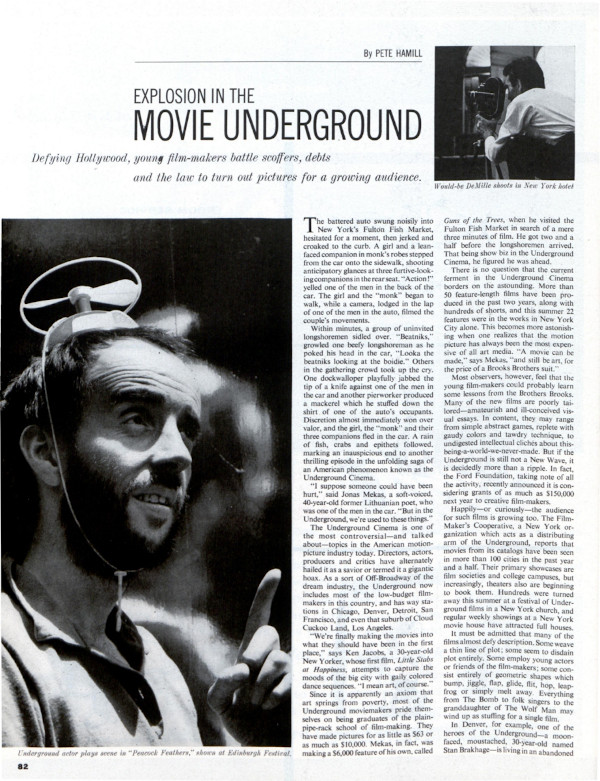
In another Post story, “The Great British Train Robbery” (September 19, 1964), Hamill covered the largest (at the time) cash robbery of all time, in which 15 men stopped a Royal Mail train and took off with more than 7 million dollars. He detailed the puzzling case of the 1963 Great Robbery and subsequent “Great Jail Break” that left British police scratching their heads and the public oddly impressed and intrigued.
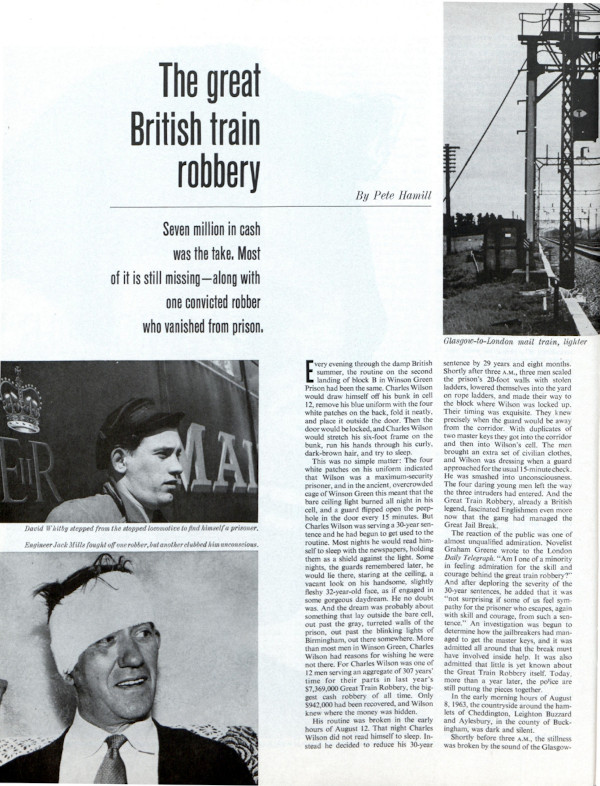
Journalists and editors mourned Hamill’s passing. New York Daily News columnist Mike Lupica tweeted “As Pete once said of another New Yorker, it’s like a hundred guys just left the room,” and former New York Times writer Clyde Haberman tweeted “the world just became a far less interesting place.” Daily News reporter William Sherman wrote in an e-mail that Hamill was about the fastest writer he ever saw: “He had an preternatural understanding of the city and its people from the top hats on Fifth to the longshoremen on 12th at the River. He knew how to listen, which he advised us beginners as most important.”
In a phone call, Gay Talese recalled meeting Hamill while covering prizefighter José Torres in the late ’50s. “I’ve been living in New York for 75 of my 88 years,” he said. “I’ve known so many different writers, from poets to playwrights to journalists, and Hamill was a combination of all of those things, and he had the capacity for and time for friendship. I felt he was one of my best friends.” Talese said that Hamill’s life crisscrossed the lives of both the writing profession and nightlife: “I knew him when he was and wasn’t drinking and I couldn’t tell the difference because he was always a nice guy … he lived an extraordinary life.”
Hamill expressed his opinions on the Post in no uncertain terms soon after it folded in 1969 in a column in The Village Voice. He had visited the deserted offices on Lexington Avenue and gave a close account of the magazine’s downfall: criticism coupled with credit where credit was due for what he saw as the interesting work done in the ’60s. “At the end,” he wrote, “with the magazine collapsing around them, the Post editors finally saw fit to commission Norman Mailer to write something for them. It will never be printed by the Post.”
Hamill’s journalistic world of pounding out copy on a typewriter and throwing cigarette butts on the floor may be long over, but his intense passion for the truth, and his tendency to take to the streets to find it, is a lasting inspiration in every newsroom.
Featured image by David Shankbone, edited via the Creative Commons Attribution-Share Alike 3.0 Unported license, GNU Free Documentation License, Version 1.2.
Fear Is Contagious: When New Yorkers Burned Down a Quarantine Hospital
—“Riot at New York,” September 11, 1858
On September 1, a mob collected and burned the principal portion of the quarantine buildings on Staten Island, only one large building being spared. The patients were first carried out, and the hospital and sheds, including the physician’s house, then set fire to and burned to the ground. Those engaged took no measures for concealment or disguise, and calculate to escape punishment, supposing that no grand jury will indict them.
A few days later, a row of six brick houses connected to the hospital was set on fire and destroyed, and soon after, the great Marine Hospital was discovered to be in flames. At the time it contained 125 patients, principally suffering from yellow fever, typhus, smallpox, and other malignant diseases.
Doctors Walser and Bessell have devoted their attentions to the sick, and are administering to their wants, although nearly exhausted from want of sleep and the excitement and exposure resulting from the destruction of the hospital and other buildings. Dr. Walser, throughout the terrible trying scenes of the last 48 hours, has acted the part of a hero and philanthropist.
Three sick men from the ship Liberty are lying on the pier, there being no shelter for them.
The rain is still pouring down, and there is no place within the quarantine walls to shelter the sick.

Featured image: Attack on the Quarantine Establishment, September 1, 1858. (New York Public Library)
This article is featured in the July/August 2020 issue of The Saturday Evening Post. Subscribe to the magazine for more art, inspiring stories, fiction, humor, and features from our archives.
Review: American Trial: The Eric Garner Story — Movies for the Rest of Us with Bill Newcott
American Trial: The Eric Garner Story
⭐ ⭐ ⭐ ⭐
Rating: NR
Run Time: 1 hour 40 minutes
Director: Roee Messinger
Streaming through independent theater websites. Find the latest links at www.passionriver.com/americantrial.html
It would be difficult to imagine a film more timely than American Trial: The Eric Garner Story — a daringly imaginative attempt to bring closure to one of the more notorious police brutality cases in recent history.
Garner was the Staten Island African-American man who, in 2014, was arrested for selling loose cigarettes on a sidewalk. He ended up face-down on the sidewalk, his neck in a choke hold, gasping “I can’t breathe” — three words that have become a haunting mantra in America’s latter-day civil rights movement.
A grand jury chose not to indict Daniel Pantaleo, the officer who tackled Garner and who, according to the coroner’s office, applied the choke hold that led to Garner’s death. So, aside from a civil suit against the city won by Garner’s family, no one paid a price.
That’s where director Roee Messinger comes in: Summoning equal measures of inspiration and ingenuity, he mounts a trial for Pantaleo on film, hiring actual defense attorneys and real-life prosecutors, and bringing in true-life witnesses to what happened that awful day on Staten Island. We meet Garner’s widow and his best friend — but we also hear testimony from genuine medical experts who differ on the cause of Garner’s death, and real ex-cops who speak urgently about the supreme difficulty of making split-second life-and-death decisions on the street.
Only one actor is employed in the cause: Bronx-born Anthony Altieri, who convincingly plays the accused as a guy who feels badly about what happened — but whose years on the beat have seemingly dulled his ability to respond emotionally to anything.
The result is a film that seems more like a nightly news summary of Pantaleo’s trial, documented by cameras mounted on the periphery of a nondescript urban courtroom. No mahogany tables or soaring windows here — the furniture is purely utilitarian, the lighting harsh, the confines almost claustrophobic. And ever-present on the soundtrack, like a minimalist musical score, clicks the keyboard of the court reporter, a touch that lends uncanny reality to the proceedings.
As the trial unfolds, Messinger seems to consciously eschew every common trope of courtroom dramas. The lawyers don’t perform Shakespearian orations — they read their opening and closing statements from laptops and pads of paper. The jurors seem to occasionally lose interest, or at least focus. There are no tight shots of sweating witnesses, no outbursts from the gallery, no stern lectures from the judge. Then there’s the perfunctory “Good morning” that each lawyer offers to every opposition witness — and their guarded “Good morning” response as they brace for the coming evisceration. This is the American trial process in all its banal beauty; the imperfect grunt work of imperfect people seemingly at odds — yet in a real sense working together to reach that elusive quality called Justice.
An American Trial: The Eric Garner Story won’t replace To Kill a Mockingbird or Inherit the Wind as the cinema’s quintessential courtroom drama, but it may well endure as the most authentic. And because it depicts a trial that never happened, it also serves as a solemn reminder that the denial of justice blocks closure not only for the aggrieved, but the accused, as well.
Featured image: Actor Anthony Altieri with witnesses, friends, and family (Passion River Films)
Funeral Service in the Time of COVID-19
On a chilly and rainy day in late April, I stood at a grave in Queens County, New York, with three mourners in protective masks, preparing to lead the graveside prayers. The casket had already been lowered, unlike how it has always been done, and it hit me that I would be praying to a hole.
The family members, who had come from Long Island to bury a 97-year-old grandmother, seemed to come to the same realization. They peered down uncomfortably into the grave, at the steel vault that covered the casket. There had been no church service or wake. And, now, they could not even be close to the casket that held their loved one’s remains.
I felt responsible, as if I were the one letting them down. But my discomfort at being unable to serve people properly was a fleeting bad moment in three draining months that have taken their toll on people like me who make their living as funeral directors. The deaths keep coming. And we keep doing our jobs. Unlike our fellow citizens, who can look away and find escape in not confronting the reality, we cannot.
As I spoke to other funeral directors in New York about what they have been going through, the same themes emerged time and time again: trying to cope as the wave of death overwhelmed us, finding a renewed sense of duty to the dead as families were kept away, fighting impossible odds to keep bodies from going unattended or shipped off to a potter’s field.
In the months preceding the U.S. outbreak, we all had watched the news of the pandemic as it played out in China and Italy. We were curious about how these countries were dealing with their dead. Perhaps it was a mix of wishful thinking and naivete that made us think, “That could never happen here.” Until it did, thrusting us into death overload by early April.
Funeral homes in the five boroughs of New York quickly became filled to capacity. As the pandemic gripped the city, the death toll in New York City reached almost 20,000 and funeral homes were forced to turn away scores of frantic families looking to bury their dead. They had neither the staff, nor capacity, to handle the surge of deaths. The city was prepared to send remains to New York City’s own potter’s field, on an island in the East River. The city order was later rescinded, but it only fueled our ever-present sense of urgency.
We all came to share grim accounts of what death had become in New York.
In Brooklyn, as a funeral home van made its way down a city street, residents called out to the driver from the sidewalks. “People were trying to flag it down because they have dead bodies in the house and the medical examiner’s not answering the phone,” Tom Libraro wrote on his Facebook page. “It just showed the desperation of people when the morgue attendants couldn’t handle it,” said Libraro, who works at Brooklyn Funeral Home & Cremation Service.
Anthony Cassieri, who owns Brooklyn Funeral Home & Cremation Service, usually handles about 450 funerals in a year. In the past month alone he has done 149.
“We couldn’t get the bodies embalmed fast enough for the people who were having viewings. There was no outlet for crematories. And we didn’t have the space to keep people.
“I had to close down for ten days to regroup,” says Cassieri. He didn’t want to be rendered as little more than a “body disposer.”
“We were still taking calls and talking to people,” he says. “Some were begging for help, telling us that they’d called 21 funeral homes, but no one could help us.”
“It’s not that we don’t want to help you. We can’t,” he and his staff told callers.
To store the bodies, Cassieri rented a refrigerated truck. Those trucks became an arresting sight outside funeral homes and hospitals around New York. Then came the discovery of 100 bodies decomposing in an unrefrigerated truck at another Brooklyn funeral home. Afterwards, the NYPD came knocking on the door of Cassieri’s business, insisting on inspecting his truck to ensure that it was refrigerated.
Cassieri presses on. He regularly begins work at 5:30 a.m. and doesn’t leave until well after midnight. In one day alone, Cassieri made 11 hospital removals.
“We’re doing our best. There are just not enough hours. We can’t move or prepare bodies fast enough. We’re locked down by cemeteries and crematories. There’s only so much we can do,” says Cassieri, who purchased additional stretchers and a new removal van. He rented a U-Haul truck to make extra removals.
It’s hard not to feel abandoned by the government. “Nobody helped us. FEMA never stepped in, and the city never called and said we could move bodies 24 hours a day from the medical examiner’s,” Cassieri says.
In our business, we, just like the families of the deceased, have relied on the comforting and predictable rituals of funeral services. No more. They have been replaced by chaos and uncertainty. There are no typical days. We adapt as best we can to rules and regulations that seem to change arbitrarily, and often without notice. Sometimes those rules seem borne of fear rather than neccesity.
At the same, we can’t help but feel a special duty as we serve as often lone witnesses at funerals that are unattended.
“Today, my daughter and I live-streamed three graveside services via Tribucast,” says Peter D’Arienzo, Market Director of Dignity Memorial, Long Island. “At two of these services, the rabbi and monsoon rains were the only ones there.” Through technology, D’Arienzo was able to bring in more than 100 guests from Israel, Germany, France, and around the U.S. “Our mission, and why we chose funeral service, is to give families under any conditions, anyway that we can, a chance to say goodbye,” D’Arienzo wrote on Facebook in mid-April.
As the number of deaths mounted, D’Arienzo’s daughter, Sophia, offered to assist. She was a nursing student, home from college. “Sophia was better at it than I was,” he says. She assisted for two weeks. Others had to fill in when D’Arienzo was forced to self-quarantine for two weeks. Dignity Memorial has live streamed over 25 services to ten foreign countries, and 35 states, with over 1,200 links opened during the COVID-19 pandemic.
They kept going even as rain swept through the area. “The most powerful services are when it is just me and the rabbi at the graveside,” D’Arienzo says.
It is a time when nothing seems easy or predictable for any of us charged with attending to the dead. At one of Cassieri’s funerals, elderly family members had rented a limousine to travel to a New Jersey cemetery. When they arrived, the cemetery refused to allow the car inside the gate. Only one person was allowed at the gravesite, Cassieri was told. “We didn’t know that. That was something that changed between us ordering the grave and getting there,” he says. The cemetery eventually relented, but allowed only one family member to get out of the car and stand by the grave. The family was left to decide who that would be.
The rules change almost hour to hour. Thomas Will, a funeral director for 50 years, was told by a cemetery in the Bronx that no more than five people could be in attendance, all of them required to wear masks and rubber gloves. But when he arrived at the cemetery with two cars bringing family members, he was told that the family would have to remain in their cars.
“You mean to tell me the priest is going to do the service and the family is going to be on the road and they can’t exit their vehicles?” he asked the cemetery official.
He went back to the family. “There’s no way that I’m going to sit in the car during my mother’s service,” said one of the daughters. She threatened to call the police. After the priest arrived, he and Will spoke with the foreman. A compromise was reached. The casket was taken out of the hearse and wheeled to the roadside. The family was able to stand outside of their cars as the priest conducted the brief committal service.
At times, New York has had to look elsewhere for help burying its dead. In the early days of the crisis, John Scalia, owner of the John Vincent Scalia Home for Funerals on Staten Island, located three crematories in Pennsylvania. In April, he would be asked to do 90 cremations, many times the normal rate, but the outreach to Pennsylvania made a difference. “We were able to keep people out of the trailers,” he says. Scalia also made it his mission to handle funerals free of charge for indigent COVID-19 victims.
“I think it’s our obligation to take care of these people. We’re in the funeral business,” says Scalia.
I have spent four decades as a funeral director. In that time I thought I’d seen just about every imaginable way of dying. But nothing could have prepared any of us for this. The days have been dark, filled with fear, frustration, and uncertainty, as we’ve had to face our most daunting challenge as funeral directors. Many of us wonder if we have fallen short of the oath we took, when we were licensed, not to violate our obligation to society or to the dignity of our profession. Maybe, as one of my colleagues said, “It takes this to remind us why we do what we do.”
Featured image: Sophia D’Arienzo live streams a funeral service at which Rabbi Ronnie Kehati officiates (Photo Courtesy of Peter D’Arienzo)
“The Water’s Fine” by John Peter Toohey
A member of the famed Algonquin Round Table, John Peter Toohey also gave Harold Ross the idea to name his magazine The New Yorker, according to Dorothy Parker’s biography. Toohey wrote for magazines for much of his life before working as a theater publicist. His short story “The Water’s Fine,” about a theme park press agent who designs a publicity stunt for his ingénue crush, was later expanded into a novel called Fresh Every Hour. His thrilling, romantic short sets the scene by invoking the 1900s vaudeville hit “I Just Can’t Make My Eyes Behave” and concludes with a climactic chase on dirigible.
Published on November 8, 1919
Jimmy Martin’s heart persisted in acting like the well-known eyes of the young lady in the song. He just couldn’t make it behave. Up to the third week of his summer season as press agent at Jollyland, the big summer amusement park near New York, it had always been a fairly well-mannered and dependable organ, which performed its physiological functions with becoming regularity and which was not accustomed to respond to any external stimuli with anything beyond an occasional slight flutter. To be sure it had acted up a little three years back in connection with a certain dark-eyed beauty who presided over the destinies of the cigar counter up in the Grand Hotel in New Haven, but that had been only a slight attack and it had resumed the even tenor of its ways after a brief interval and had been unobtrusively going through its routine activities ever since.
A most prepossessing young person whose parents had inflicted upon her the name of Miss Lolita Murphy was directly responsible for the alarming symptoms already hinted at. From the precise moment that Lolita came within his ken Jimmy ceased to be a rational being in full control of his faculties; and his heart, in sympathetic accord with the agitated condition of its owner, began to put on an antic disposition and indulged in curious palpitations of a most annoying nature on the slightest pretext. The usual provocation at first was the sight of Lolita herself, but after a day or two even the thought of her produced a cardiac rataplan that would have done credit to the trap drummer of a jazz band.
Lolita, it may be mentioned in passing, lived up to all the implications of the somewhat picturesque cognomen given her by McClintock, the park manager, when Jimmy first pointed her out to his superior.
“She sure is Miss Lulu Looker,” McClintock had remarked emphatically.
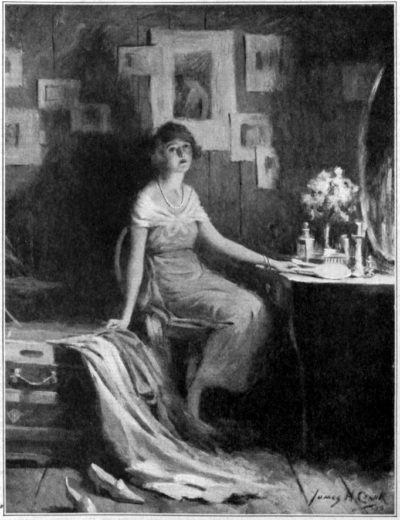
Lolita was all of that and a little more. Jimmy was not a poet, and he was therefore unable properly to voice the feelings he had about her beauty. Had he been one he might have justly said that her cheeks seemed to have been kissed by the rosy flush of dawn; that in her sable eyes there lurked the eternal mystery of night beneath tropic skies; that her dark hair was as fragrant as the spices of Araby and that her lithe figure had all the gracile curves of a bounding antelope. As it was, he contented himself with the frequent repetition of the decidedly unpoetic expression “some gal,” but this represented to him all the ideas noted above and a liberal assortment of others equally glamorous.
Lolita hailed from a small city in Iowa, and ever since the memorable occasion when Maude Adams played Peter Pan in that city for one night only she had cherished a great and overwhelming ambition. Her father ran the drug store next door to the opera house and was a great crony of the manager’s. A number of boys and girls were picked up in each town to play the children in the Never Never Land scene and Lolita’s fond parent had inveigled the manager into selecting her as one of the group. It was a step that father was to regret vainly for many years, but on the night of her debut he was blissfully unconscious of the possibility of any bitter repining in the future and enjoyed the proceedings almost as much as Lolita did.
From that time on Lolita felt the call of the footlights and became convinced that, given the proper opportunities for the externalization of the emotional feelings that lay dormant within her, she was destined to become an international celebrity and the queen regnant of the English-speaking stage. Chauncey Olcott came to town a few weeks later and she persuaded father to work her in as one of the youngsters to whom he sang a lullaby in a high tenor voice down in the “glen,” which is always the setting for the third act of an Irish play.
After that there was no holding her. She became a student at Miss Amanda Holliday’s School of Dramatic Expression, which occupied three rooms on the second floor of the Turner Block on Main Street, and she participated in the semiannual entertainments given by the budding geniuses who were under the tutelage of that small-town preceptress of the arts. Versatility was her middle name. At one time she would play Ophelia in the mad scene from Hamlet, and appear later on the program in a Spanish dance with castanets, a lace mantilla and all the other necessary properties. Six months later she would combine the balcony scene from Romeo and Juliet with an imitation of an imitation of Eddie Foy she had heard given by a monologue artist at the Orpheum Theater.
At the age of nineteen she was the town wonder. The dramatic editor of the Democrat-Chronicle predicted that within a short time “this talented daughter of our esteemed fellow townsman, Henry P. Murphy, seems destined to occupy one of the stellar places in the front ranks of the worthwhile artists of our fair country.”
Lolita moved on to New York armed with a letter of commendation from Miss Amanda Holliday setting forth that she was “worthy of consideration for any role no matter what its importance” and urging theatrical managers “not to neglect this opportunity of obtaining the services of one who is a mistress of the mimetic art in all of its manifold manifestations.” She also carried a full set of clippings from the Democrat-Chronicle, one half of her male parent’s attenuated account in the First National Bank and an overabundant supply of cheery optimism.
The metropolitan managers’ office boys were decidedly cold to the advances of this gifted daughter of the Middle West. They treated her with that air of careless indifference so characteristic of their profession. With one accord all the big and little producers decided to take a big chance and neglect the opportunity which Fate was offering them. They were unmoved by the clippings from the Democrat-Chronicle with which Lolita bombarded them through the mails, and they were callous to the eulogistic outpourings of Miss Amanda Holliday, copies of which accompanied each written request for an interview. Lolita’s cash reserve grew perilously low and disaster threatened. Then on a morning when disillusionment and despair moved in and took lodgings in her soul she saw an advertisement in a newspaper which was like a life buoy tossed to a drowning man.
“Ambitious Young Women Wanted for Stage Work,” it read. “Opportunity Afforded Ambitious Amateurs to Perfect Themselves in Dramatic Technic — Apply Immediately at Manager’s Office, Jollyland.”
Lolita, filled with high hopes, took a trolley to the great playground by the sea. There, Destiny handed her one of those cold douches that are sometimes held in reserve for those whose ambitions o’erleap themselves. The dramatic opportunity promised in the advertisement proved to be what might be vulgarly termed a job.
A great free open-air spectacle was in process of preparation at Jollyland under the supervision of a famous moving-picture director who specialized in that form of animated art technically known as serials. He had personally conducted a gazelle-eyed cinema celebrity known as June Delight through four fifteen-reel affairs of this sort, in which she had been threatened with mayhem, aggravated assault and battery, felonious wounding, and total and complete annihilation at the hands of numerous bands of cutthroats, bandits, thieves and white slavers. In the course of these proceedings she had performed every breath-catching feat that the festive imagination of the director had been capable of conjuring up, and had succeeded by a miracle in keeping out of both the hospital and the obituary columns of the daily press.
Now it was proposed to let the public have a close-up view of this death-defying marvel in the flesh in the act of performing one of her most famous exploits “before your very eyes and for your attention,” as the circus announcer would put it. To permit of this the director had evolved something which he called a dramatic spectacle and had persuaded the management of Jollyland to arrange for its production in a huge, specially constructed open-air auditorium as a special added attraction intended to put a final quietus on the presumptuous efforts of a rival group of showmen who were endeavoring to rouse interest in a new park just opened that summer.
Lolita found herself in a long line of applicants, many of whom were pathetically peaked and undernourished looking, and when her turn came to meet the director she made up her mind to pocket her pride and accept whatever fate offered rather than run the risk of finding herself in like straits. Ambition still fired her soul and she was determined not to return to the little old home town until she could enter it in something at least closely akin to a spirit of triumph. To be sure the opportunity offered her was not particularly roseate. It did not hold forth much promise of either pecuniary reward or even of passing fame, but it meant that Lolita would not have to telegraph home for funds and there was a faint glimmer of hope in a remark made by the director.
“You can mingle in the front ranks of the crowd,” he said. “We’ll pay you eighteen a week. There’ll be only two shows a day.” Then he had looked at her critically. “You’re almost a ringer for Miss Delight,” he concluded. “Maybe if you’re a good little girl I might take a notion to try you out as understudy.”
So Lolita Murphy, the pride of her home city, became a small and almost infinitesimal part of the great outdoor spectacle entitled Secret Service Sally, which was the big sensation of the Jollyland season.
In the role of an agent of the United States Secret Service the charming and fascinating June Delight was swept through a series of thrilling adventures set against spectacular backgrounds depicting scenes in Berlin, Tokio, Rio de Janeiro and other world capitals, and as a culminating feature she was pursued to the roof of a building in London by a howling mob which suspected her of being a spy in the employ of the Central Powers. She was saved from its hands, in the proverbial nick of time, by her fiancé, dashing Lieut. Thurston Turner, commander of the United States Dirigible N-24, who happened to be cruising about the neighborhood at the moment and who effected a rescue by circling his ship round the roof and deftly lifting the young woman into the shelter of the gondola which hung from the great gas balloon just as she was about to be beaten to death by the crowd.
Inasmuch as the spectacle was given in the open air it was possible to use for the purposes of this scene a real dirigible, which was manned by a crew commanded by one Bobby Wilkins, a personable young gentleman from Chicago who had come back from France with a major’s commission, a reputation for dare-deviltry as an aviator surpassed by no other ace in the American service, and a collection of a half dozen assorted war medals bestowed by three grateful nations. Bobby had left a snug berth as assistant to the president of a big varnish company to go into the Army, the said president being a somewhat indulgent parent who had sanguine expectations concerning his son’s commercial and industrial future and who was even now sending him daily wires to the Ritz-Carlton urging him to “cut the cabarets and get down to a solid rock foundation.”
Father labored under the delusion that Bobby was simply vacationing in New York. Had he had an inkling of just what his son was doing he would have — to use the young major’s own expression — “tried for a new altitude record himself.” He couldn’t be expected to know that dictating fool business letters and checking up the new efficiency expert’s monthly report of economies effected at the Dayton plant wouldn’t exactly appeal any more to an adventuresome young man who had been skyhooting through the upper reaches of the atmosphere for nearly two years and dodging German machine-gun bullets.
Bobby had overheard the general who commanded the aviation camp at which he was demobilized remarking about a request made by the moving-picture director that he recommend some aviator for the task of piloting the dirigible which was to play such an important role in the spectacle, and he had offered himself for the sacrifice just as a lark. He found the experience rare sport and until something giving greater promise of adventure appeared in the offing he was determined to go on with it. Twice a day he reached down and plucked up the beautiful Miss Delight as lightly as if she were a fragile doll while the assembled thousands, on the qui vive with excitement, burst into rapturous applause. In order to insure the peace of mind of Robert Wilkins, Sr., Jimmy Martin had consented rather reluctantly, it must be admitted — to respect the wishes of the impersonator of Lieut. Thurston Turner, U.S.N., who had expressed a desire to remain incognito. Otherwise the consequences might have been lurid.
Jimmy itched to give out a story concerning the social and business connections of the young soldier, but he had given his word and, being an ex-newspaper man, that was sacred. He temporarily forgot about Bobby and devoted his spare moments to figuring out ways and means for the sensational exploitation of Lolita Murphy, to whose charms, as previously recorded, he had become a shackled slave from the moment he first glimpsed her at rehearsal.
Lolita, it may be mentioned in passing, was a trifle discouraged at the comparatively slight opportunities for uplifting and otherwise ennobling the American stage offered by her participation in Secret Service Sally. Her name wasn’t even mentioned on the program. She figured under an impersonal heading at the bottom, together with a couple of hundred other young women who were listed as “Berlin citizens, Japanese geisha girls, South Americans, Londoners, etc., etc.”
It needed all the soaring optimism of Jimmy to keep her from slipping into a nervous decline. The press agent had obtained an introduction through the stage director, and his sympathetic interest in her temporarily sidetracked ambitions had won him her esteem and high regard from the beginning. Jimmy was a rapid worker and within three days from the time of their first meeting he had vowed his ardent and palpitating devotion, and though Lolita had not completely committed herself to a reciprocal affirmation she had succeeded, nevertheless, by devious and subtle devices not unknown to her sex, in conveying the distinct impression that the star of hope was visible in the eastern sky.
There came a night when Lolita’s disappointment was past all bearing and when she sobbed out on Jimmy’s shoulders a bitter protest against the fate that had driven her into believing that she was destined to be a great actress. They were sitting on the beach in the moonlight after the show, and off in the murky distance the great Sandy Hook light was blinking like some monster firefly.
“Jimmy,” she said half chokingly, “I just don’t belong. I wish I was back in Iowa.”
“Gosh, that’s an awful wish, girlie,” responded the press agent with a foolish attempt at a pleasantry which he instantly regretted. Lolita drew away from him quickly and flared up.
“Iowa’s all right,” she retorted. “It’s better than this lonesome place.” She lapsed almost immediately into a wistful mood. “It’s just ten o’clock there now and the movies are letting out and there’s a crowd in dad’s store and the fellows are treating the girls to sundaes or just plain ice cream and dad is fussing round and yelling to poor Porky Brooks to get a move on and keep the orders filled, and like as not he’s helping out himself. I want to go back, Jimmy; I want to go back.”
Jimmy touched her gently on the hand and then squeezed it softly.
“Listen, girlie,” he said comfortingly. “I know just how you feel — the cards ain’t runnin’ right and you want to quit the game, but I’m goin’ to cut in with a clean deck and start a new deal. I’m goin’ to fix things so that when you do go back for a visit to the little old home town and the old folks the Peerless Silver Cornet Band is goin’ to be down at the station, and the Mayor is goin’ to speak a few well-chosen words of welcome in the presence of a cheering crowd of friends and wellwishers. Leave it to me.”
Lolita laughed a little in spite of her mood.
“You’re a great little jollier, Jimmy,” she said, “and I’d like to believe you, but somehow I can’t. I’m a nobody, a small-town nobody.”
“But you’re goin’ to be a little Miss Lolita Somebody of the well-known world,” he responded cheerily, “before I get through with you. I’m goin’ to drop you right into the direct center of the front page of every paper in the U.S.A. from the New York Gazette to the Wyalusing, Pennsylvania, Rocket. You’re goin’ to make all the rest of them look like shrinkin’ violets on a foggy afternoon when I finish up with you. You just wait and see.”
“How long have I got to wait, Jimmy?” ventured Lolita, who was adrift in the realms of fancy, carried thither by the soothing cadences of Jimmy’s voice.
“Only until some afternoon when this June Delight person fails to show up. I hear she’s talkin’ of layin’ off for a few days. If that doesn’t happen by the middle of next week, I’ll get to her chauffeur and frame it so that she misses the show. Then we’ll pull the big act. If you’ll promise not to talk about it even in your sleep I’ll hand you a little advance information on the subject.”
Only the silent stars and the discreet moon shared Jimmy’s confidence with Lolita. Its general tone and tenor lifted that despairing daughter of the plains out of the rut of hopeless striving into which she felt she had fallen and filled her with such anticipatory delight that when she said goodbye at the door of her boarding house she impulsively reached forward and kissed him full on the mouth.
“You’re a darling!” she murmured.
“I’ll take an encore on that, girlie,” he replied. And he did.
II
Miss June Delight summoned Manager McClintock to her dressing room just before the Saturday-night performance and successfully simulated the classic symptoms of impending nervous prostration while she sniffed at a vial of smelling salts and submitted to the ministrations of a tired maid who gently massaged her forehead with her fingertips. Miss Delight in a voice that was barely audible informed the manager that she could not possibly endure the trying ordeal of further performances after that evening without a brief period of rest and that she was leaving for a week’s stay at a sanitarium on the following morning.
McClintock gave voice to low moans and flew other signals of distress, but Miss Delight was obdurate to his more or less frenzied expostulations and remarked that though she was disturbed at having to disappoint her dear, lovely, friendly public she felt that her health was the prime consideration. The manager was in a surly mood when he left her to seek out the stage director.
“Who’s the understudy?” he inquired.
“She calls herself Lolita Murphy,” replied the director, “but I understand there’s a certain party connected with the publicity department who calls her even flossier names than that.”
“Jimmy’s gal, eh?” commented the manager. “Well, she’s there with the looks anyway. Has she had a rehearsal?”
“She’s been through the thing roughly with the rest of the understudies, but I can have the whole troupe called for tomorrow morning and we can run straight through. We’ll get out the dirigible and go through with the rescue stunt. We mustn’t fall down on that. The little lady seems to be there with the nerve, but I’d like to try it out.”
Jimmy was permitted to break the news to Lolita. He met her after the performance that night and imparted the glad tidings. When he left her he gave her a final word of caution.
“Keep the little old nerve up, girlie,” he said earnestly, “and we’ll wake up the whole country on Monday morning.”
“I’ll try, Jimmy,” she whispered. “You’re just the — well, just the dearest boy I’ve ever known.” On the following morning Lolita, athrill with excitement and a little nervous, assumed the title role in Secret Service Sally at a rehearsal, to the complete satisfaction of McClintock, the stage director, and Jimmy Martin. The latter watched her with adoring eyes and when she successfully essayed the sensational rescue scene he was moved to wild and clamorous applause, which sounded a bit startling in the great empty auditorium. Under Bobby Wilkins’ expert direction the big clumsy dirigible was maneuvered round the edge of the roof and Lolita was lifted into the car by the former ace with such adroit ease that the whole thing seemed to be simply part of a casual everyday occurrence. When it was over and Lolita had been safely landed back on earth and had received the congratulations of everyone concerned she drew Jimmy aside and clutched at his arm for support.
“I’m ready to faint,” she said weakly. “I believe I would have up on the roof when I saw that big thing coming toward me if that fellow hadn’t grabbed me off so quickly.”
“You need a little nap,” responded Jimmy soothingly. “The worst is over and the best is yet to come. Don’t forget that young Mr. Arthur H. Opportunity has a date with you this afternoon and that the big splash is due tomorrow morning. Now you go in and get a little sleep and I’ll have a talk with my friend the handsome lieutenant. I fixed things with him last night, but I’ve got to go over some details again.”
A few minutes later the press agent was closeted with Bobby Wilkins in the hangar in which the dirigible was housed. The park gates had just been opened for the day and crowds of holiday merrymakers were surging through them in quest of the fifty-seven varieties of feverish and hectic entertainment which Jollyland provided for those in search of diversion.
III
If anyone had called Jimmy Martin a psychotherapist he would promptly have denied the soft impeachment first and then asked for a dictionary and an explanatory blueprint. And yet as a direct result of a random idea which had bobbed into his active mind a few weeks before he was unconsciously serving in that capacity for a large and ever-increasing throng of metropolitan society women of varying ages who flocked to Jollyland in search of a new thrill which he had provided. The winding up of war-charity work which had followed close upon the return to these shores of the larger part of the American Army had turned many of these women back upon their own resources; and their innate restless activity, which had found such an altruistic outlet in new channels for several years, now imperiously demanded fresh excitement, and it was this that Jimmy offered them.
On the occasion in question Jimmy had overheard a coy young debutante who was watching a performance of Secret Service Sally remark to a group of friends who accompanied her that she’d just love to go up on the stage and mix with the crowd! That was enough for the press agent. Ten minutes later, during the intermission, he escorted the entire party behind the scenes, and under his guidance they participated in the London episode which concluded the show. They mingled with the crowd of supernumeraries and entered into the proceedings attendant upon the thrilling dirigible rescue with such gusto that the stage manager gave Jimmy carte blanche to encourage the idea.
It happened that in this particular party were several of the socially elect and the papers next morning carried extensive stories chronicling the event, coupled with the announcement that the park management would, throughout the season, be pleased to extend the privilege of participating in the entertainment to other groups who might wish to take advantage of the opportunity for this unusual form of entertainment. Society seized upon the idea voraciously and Jollyland parties gave a new fillip to the summer season at all the Long Island resorts. Elderly matrons of ample girth vied with the members of the younger set in setting the pace, and in many instances came again and again to become a part of the great spectacle. For the first time in its history Jollyland began to figure in the society columns of the daily press, and great was the prestige which Jimmy enjoyed in McClintock’s eyes as a result.
The particular luminary of the Long Island season at the moment and the prospective lion of the month of August at Newport was none other than the Hon. Betty Ashley, daughter of the second Lord Norbourne, and the most talked about young woman in English society for a period the beginnings of which antedated the war by several years. Before the great European conflagration, the Honorable Betty, though then still in her early twenties, was a European celebrity. Spirited, impulsive and headstrong by nature she had early rebelled against the ultraconservative traditions of her family and had so thoroughly flouted convention that her name was on the tip of the tongue of everyone in the tight little island. She began it by publicly slapping the face of a certain deposed kinglet who had sought refuge and a safe haven in England and whose sole offense had been a mild protestation of love, made at a fashionable garden party.
There had followed her sensational and entirely unarranged presentation of a petition for woman’s suffrage to England’s monarch himself at a formal court reception — an incident which sent her dignified father to his bed for two weeks; her arrest on suspicion of being implicated in a militant attempt to set fire to the House of Parliament and her subsequent acquittal after she had refused to make any defense against a damaging array of circumstantial evidence; her jilting of the Earl of Maidsley in an explanatory and derisive letter to the Times; her winning of the amateur tennis championship; and a host of other incidents of an unconventional nature.
Then the war had come and she had gone over to France in the first months as a motor driver and had still managed to keep in the public eye for five years despite the somewhat considerable amount of attention devoted in the newspapers to the great struggle. She had, for one thing, won a D.S.O. for bravery under fire in the First Battle of Ypres; and she had, for another, been reprimanded in orders for organizing a ball at a certain château occupied by the staff of a certain corps during the absence of the commanding general at a conference at G.H.Q.
Now she had come to the United States for the first time and had materially assisted in putting zest and punch into a round of festive house parties on Long Island given by prominent members of the swiftest-moving coterie of the so-called smart set. Small wonder that when she heard of the expeditions to Jollyland which were enjoying such a vogue she should elect to organize one herself.
“I’m not entirely a rank amateur, my dear,” she confided to her hostess when the party was preparing to depart. “I went on for two nights running in the chorus at the Alhambra last winter on a five-pound wager and I’d have stuck it out for a whole week for the fun of it if the pater’s blood pressure hadn’t been running abnormally high. The old dear would have gone all to smash if he had found out, and he might have if I’d kept on.”
The Honorable Betty, her dark beauty set off by a rose-pink silk sweater and a tam-o’-shanter to match, was in the first car of the string of six which disgorged a laughing crowd of merrymakers in front of Jollyland on Sunday afternoon. They made for the big arena immediately, as it was within a few minutes of the advertised time for the ringing up of the curtain on the great spectacle. The Honorable Betty let it be known to an usher, who was duly impressed by her air of authority, that she craved an immediate interview with the manager. McClintock, still disturbed at the defection of the capricious Miss Delight, responded grudgingly; was apprised of the identity and mission of the distinguished visitor, and sought out Jimmy Martin in great excitement. He found the press agent back on the stage.
“Say, young fellow,” he said enthusiastically, “I’ve got a Monday-morning story for you all ready-made and ready to try on! This Betty Ashley who’s been grabbing off space all over the world for a long time and who’s the big noise with the real folks over here this summer is out in front with a crowd right out of the Social Register and she wants to go on in the London scene. I told her she could. Get busy now and prepare for a general assault on the press.”
Jimmy received this intelligence with a glumness that rather annoyed McClintock.
“What did she want to pick out today for?” he inquired uneasily.
“What’s the matter with today? It’s the best day possible for a good break for us. The papers are always glad of anything that makes a noise like a story on Sunday. What’s the matter?”
“Oh, nothin’,” replied Jimmy absentmindedly; “only I wish she’d waited until the middle of the week. I was kinda figurin’ on — Oh, nevermind; it’ll be all right.”
IV
An acute observer would have detected signs of suppressed excitement in the general demeanor of Jimmy Martin during the progress of the early scenes of the great spectacle in which Lolita Murphy was essaying the leading role for the first time on any stage. He had exchanged his customary cigarette for the solace of a particularly formidable-looking cigar, which he puffed at nervously as he sat in the manager’s box with his cap pulled down over his eyes. His whole body was tense and rigid, and though there was a look of adoration in his eyes there was something more — a vague something that seemed to spell apprehension.
Justice compels the admission that Lolita was doing herself proud. She moved through the thrilling situations of Secret Service Sally with the ease and calm assurance of a veteran and more than merited the applause which the vast holiday audience showered on her. When the curtain rose on the final scene — the one depicting the streets of London — the audience, keyed up to expectant excitement by the gaudy promises of the program, held its collective breath and Jimmy sank his teeth viciously into what remained of his cigar. McClintock slid into the seat alongside of him.
“That gal of yours is sure making good!” he remarked good-naturedly. “If she goes through to the finish as nicely she’ll find a surprise in her envelope on Saturday night. There’s that English society dame and her party strolling along just as if they were back in dear old Lunnon. I had Lawrence, the assistant stage manager, go on with ’em to put ’em wise to all the business.”
The mimic street on the stage was thronged with a motley crowd of supernumeraries who were supposed to represent the populace of the British metropolis out for an airing on a bank holiday. The rose-pink sweater of the Hon. Betty Ashley was the most conspicuous object in view. That patrician lady bobbed in and out among the others, apparently having the time of her life and urging her friends, with violent pantomime, to enter into the festivities with something akin to her own enthusiasm.
Presently the audience heard a murmur pass through the crowd on the stage and Jimmy’s acute ear detected the muffled purr of the motor on the dirigible, which was at that moment maneuvering for position and awaiting its cue two hundred feet in the air just behind the backs of the last row of spectators. The press agent grabbed the railing in front of him and leaned eagerly forward. He was watching the right side of the stage.
A motor car shot out of the wings through a lane in the crowd. In it sat Lolita Murphy in the role of queen of the American Secret Service. It was plain that she was simulating great anxiety and that she was being followed. She looked apprehensively over her shoulder and the audience could catch excited shouts of “Stop her! Stop her!” A gigantic bobby stepped directly in the path ahead of the car and drew his revolver. The chauffeur pulled a lever and the car stopped abruptly. A man on a motorcycle came dashing up.
“Arrest her!” he shouted and he sprang from the saddle. “She’s a German spy from the Wilhelmstrasse.”
Lolita looked about furtively, poised herself for just a moment and then leaped out of the car, overturning an athletic super and making for a doorway as the crowd broke into frenzied cries of “Kill her! Kill her!” The incident had been rehearsed with the utmost regard for actuality, and as the mob surged after the suspected spy the vast throng of spectators swayed with excitement like a field of tall grass in a breeze. Lolita reached the safety of the doorway by almost the fraction of an inch and disappeared. The crowd poured in after her and McClintock caught Jimmy’s arm as he caught sight of a vanishing flash of rose-pink.
“Damned if that English dame isn’t right in at the death!” he said excitedly. “She’s going up on the roof.”
Jimmy didn’t reply. He was watching the roof of the make-believe building with eyes that were strained and staring. As Lolita emerged from the hatchway and plunged forward with a fine gesture of despair, he looked back over his shoulder for a moment and noted that the N-24 was slowly swinging forward and that the alert and eager face of Bobby Wilkins was visible over the edge of the car which hung from the rear of the big balloon.
Lolita held out appealing hands and gave voice to cries for assistance. The crowd, in the vanguard of which was a lady in a rose-pink sweater, with cheeks that were flaming and with eyes that were dancing, swarmed up through the opening and surrounded the suspected spy. The supernumeraries’ voices became a blended babble of inarticulate cries and 3,467 spectators watched the developments in a tense silence.
Nearer and nearer swung the great dirigible. Lolita was now in the hands of the mob, with which she struggled fiercely. As the N-24 swung round the corner of the roof she turned as per instructions, but Jimmy noticed with a gasp of concern that she had turned in the wrong direction and that she was making her way to the wrong side. She was evidently bewildered. Bobby Wilkins was leaning out of the car with his arms outstretched and was beseeching her to run toward the other side of the roof. In another five seconds the dirigible would have passed on and the spectacular finish of the big show would be ruined. McClintock swore softly. Jimmy sat as one entranced.
Some of the supers were pushing Lolita to the other side, but she seemed to be in a panic and struggled with them as if still acting the earlier scene. At this juncture Jimmy noticed that a lady in a rose-pink sweater had run to the edge of the roof, just above which the dirigible was moving, and that she was holding up her arms. His cigar dropped from his mouth a second later when he saw Bobby Wilkins grab her outstretched hands, swing her clear of the roof and pull her into the car as the great dirigible finally cleared the scenery building and in quick response to the hand of the pilot in the front car nosed her way upward at a higher rate of speed. The curtain fell and the repressed excitement of the great audience found vent in tumultuous applause. The thing had happened so quickly that there were apparently few who had noticed that the wrong young woman had been saved from death by the timely arrival of Lieut. Thurston Turner, U.S.N.
“What a whale of a story!” chortled McClintock, gripping Jimmy’s arm so fiercely that the press agent winced with pain.
“Yes, isn’t it?” responded Jimmy dreamily as he watched the N-24 winging her way over the park and out toward the sea. The spectators had risen from their seats and were applauding again as a big American flag was unfurled from the rear car of the dirigible.
The balloon kept on its way toward the ocean, and as McClintock noticed that it didn’t make the turn it usually did when it reached the giant roller coaster that ran along the shore a puzzled expression came over his face. If he had looked at Jimmy sharply just then he would have observed the first beginnings of a pleased smile tilting the corners of the press agent’s mouth. A minute passed and the great yellow gas bag receded farther and farther in the distance. McClintock stepped down and borrowed a field glass from a spectator. He glued his eyes to it for a few moments and then dropped his arms. His face had gone pale.
“His motor’s dead,” he said weakly, “and he’s drifting out to sea. The propeller’s stopped and he’s being carried out by this land breeze. We’ve got to do something — we’ve got to get help of some kind.”
The manager was plainly worried. He pressed the glass on Jimmy, who had followed him out of the box, and the latter watched the clumsy balloon, now at the mercy of the stiff breeze which had blown up, slowly but surely disappearing in the opalescent haze which hung above the line where sky and ocean seemed to meet. The owner of the glasses had overheard McClintock’s remark and had passed the word on to his neighbor. In two minutes the news had spread through the great crowd, and thousands of eyes were focused on the drifting speck, which presently vanished. McClintock pushing Jimmy before him started for the main office and found himself surrounded by an excited group of men and women. An upstanding chap in a British major’s uniform who wore a cap on which was the red-velvet band of a staff officer stepped forward.
“We’re Miss Ashley’s friends,” he said with a touch of feeling in his voice; “and we’ll do everything we can to assist you. She’s a bit untamed, sir, and she shouldn’t have done that wild foolish thing, but she’s the best woman alive for all that, and now that she’s in danger we’re going to help you see her out of it. Has that dirigible got a wireless on board?”
“No,” replied the manager. “There wasn’t any need for one. Since it’s been here it’s never been more than a mile or two away from the hangar before.”
“That’s bad — damned bad,” responded the officer. “Of course maybe they’ll be able to fix the engine, but we can’t take chances on that. If you’ll let me use your telephone I’ll call up our embassy in Washington and get them to get in touch with the Navy Department. We’ll have all the ships in range of the Arlington station on the lookout in an hour.”
The thoroughly sobered group of pleasure seekers who had accompanied the Honorable Betty to Jollyland two hours before followed McClintock and Jimmy Martin into the offices in the administration building and talked in low voices while the major began to fuss in the telephone booth with the long-distance operator. Some of the women were weeping.
V
In the seclusion of his private office Jimmy telephoned a press syndicate, the police and the nearest United States lifesaving station, in the order named, while McClintock, who was plainly tremendously worried, paced restlessly up and down the floor, pausing occasionally to glance out of the window at the broad expanse of sky and sea, in the vain hope that some sight of the lost dirigible might greet his eye. Just as Jimmy began calling up the metropolitan newspaper offices in a fine frenzy of excitement both men heard the office door slam violently. They turned in unison and found themselves confronted by Lolita Murphy. Gone were the shy manner, the demure smile and the air of coy ingenuousness. Her cheeks were flushed, her eyes were blazing, and her whole manner indicated that she was in what is generally referred to as a “state of mind.”
“Hello, girlie,” Jimmy called out pleasantly. “What’s the matter?”
“Don’t you dare girlie me, Mr. James T. Martin!” retorted Lolita in a voice that she was palpably trying, with a great effort, to keep at an even and menacing tone. “Don’t you dare to speak to me again! I came in to tell you that and to let you know that even if I do come from a small town I can’t be fooled by any New York — by any New York — bunko man!”
Her voice broke on the last word and tears came into her eyes despite the struggle she was making to hold herself in hand. Jimmy came toward her, but she waved him off hysterically. McClintock watched the proceedings in amazement.
“What’s the idea, Lolita?” began the press agent beseechingly. “I don’t get you. I don’t understand.”
“Don’t try to tell me that,” ran on Lolita, who was now half sobbing. “Don’t try to tell me that you didn’t turn me down when that English girl came into the park with all those society people and that you didn’t get together with that Wilkins fellow to have me left there so you could get a better story out of it with her. You fixed it all up and you can’t tell me that you didn’t because I just know, that’s all. I have a sweater on under my dress so’s I wouldn’t catch cold and I had milk chocolate in my pocket and I’d written home to mother about its going to happen and telling her not to worry about anything she might read in the papers the first day, and now nothing’s happened at all to me and I’ve been made a fool of and it’s all your fault and if you ever try to come near me again or speak to me I’ll slap your face, Mr. James T. Martin, I’ll slap your face. Do you hear me, Mr. James T. Martin, I’ll slap your fresh little face!”
She was gone before Jimmy could remonstrate. The door closed behind her with a more reverberating bang than the one which had heralded her entrance. Jimmy dropped into the nearest chair and gazed vacantly into space. McClintock shook him roughly by the shoulder.
“Say,” he shouted, “what in the name of glory is this all about?”
“She handed me the mitt, Mac — she’s handed me the mitt, and she wouldn’t even let me explain,” responded Jimmy brokenly. “It’s the real heart-throb stuff this time, Mac, the real heart-throb stuff. I had everything framed up for her, and this English jane just drops in like a joker tannin’ wild and wins the hand.”
“You had what framed?”
“Why, this drifting-out-to-sea stunt,” replied Jimmy in a dead voice.
“This drifting out to sea — You don’t — you can’t mean that this thing is a plant!” gasped the manager incredulously.
“Of course it is!” returned the press agent with something of the old note of self-assertiveness in his voice. “I had it all fixed up for Lolita, and now this society dame is goin’ to get away with all the headlines. When I saw Wilkins pull her into the car I didn’t think he’d go all the way through, but it looks as if he’s decided to. There’s no use worryin’ about it. Every little thing is comin’ out all right — and, say — don’t forget to remember that it’s goin’ to be some story now — some story!”
“Just let me get this big idea through my head,” persisted McClintock. “What happens next?”
“Of course his motor hasn’t really gone dead,” replied Jimmy. “He’s just ordered his engineer to shut it off so they can drift with the wind. That was all framed up between us. He’ll probably turn on the gas again and cruise round out of sight of land for a couple of hours and shut off his engine every time he sees a ship comin’ in sight. That’ll be an alibi for the story. When the little old sun starts to sink in the west he’ll turn that big bag toward the Jersey coast and he’ll make a landing just before dark at a place we picked out yesterday morning. He’s going to lay under cover there, and we’ll keep the country guessin’ all day tomorrow.”
“But someone will see him land,” criticized the manager.
“I don’t think there’s a chance of that,” replied Jimmy jauntily. “We picked out a spot that’s as lonesome lookin’ as an iceberg. There isn’t a house within two miles and there’s nothin’ but marshland all round. There’s one little place right in the center that’s high and dry. That’s where he lands. Wilkins has got his car planted a couple of miles away and his chauffeur is goin’ to be right on the job in a rowboat — you see there’s a little creek that runs through the swamp — and the girl is goin’ to be taken away in the boat and slipped away to a hotel — that is, Lolita was goin’ to be slipped away and was goin’ to keep dark until she got the signal to appear again. Maybe this society queen’ll be game enough to go through with it just for the fun of the thing.
“We were goin’ to keep the agony up until tomorrow night at the earliest, and maybe until the day after tomorrow. Then Wilkins was goin’ to telephone that he’d just landed after bein’ tossed about in the air and all that, and Lolita was goin’ to have a nervous collapse and be interviewed in bed by a flock of reporters with a couple of trained nurses and three doctors hovering round in the offing. You can fill in the other details yourself. Anyhow, it’s a grand little notion for a story, even if this Betty Ashley person doesn’t come through. We’ll know about that tonight.”
“How so?”
“Why, the chauffeur has instructions to telephone me the minute he gets to the hotel. That ought to be not later than nine-thirty.”
“Why didn’t you tell me all about this beforehand?”
Jimmy smiled a bit guiltily before replying.
“I had a hunch that maybe you’d put the kibosh on the whole scheme because I was featurin’ a certain party too much,” he responded. He grew serious again for a minute and a far-away look crept into his eyes. “Say, Mac,” he went on, “I had a number that called for the grand prize and I’ve lost the ticket. It’s rotten luck. From the way she spoke a few minutes ago I’ll bet I don’t ever get out again, not even on probation.”
“That’ll be all right,” consoled McClintock. “I’ll fix that part of it for you. It’s a great story even if the Hon. Betty Ashley doesn’t go through, and if she does — why, if she does it’ll be the biggest thing ever pulled off in this country. Think of that for a little while.”
The press syndicate and the metropolitan newspapers were inclined to be a bit skeptical of the facts which Jimmy telephoned them at the outset, but outside confirmation was forthcoming promptly and within two hours after Maj. Bobby Wilkins and the Hon. Betty Ashley had disappeared in the general direction of the open sea the story was the sensation of the summer in journalistic circles.
A squad of picked feature writers invaded Jollyland in quest of detailed particulars concerning the events leading up to the beginnings of the ill-fated balloon trip; seven sob sisters motored to the palatial home at which the Honorable Betty was a house guest and interviewed a weeping and distraught maiden aunt of that lady, who had been acting as a submissive chaperon and who was certain that when “dear Ned, her father, hears the news he’ll froth at the mouth and have a stroke”; cables were frantically dispatched to London instructing correspondents to break the news to dear Ned and watch the results; city editors pawed over assortments of photographs of the beautiful heroine and conferred with art-department heads as to the most suitable ones to use for decorative layouts; dozens of leg men were sent out to points along the Jersey and Long Island coasts with directions to watch for any possible news of the return of the balloon and to keep on the lookout for any pleasure-yacht owner who might have seen the dirigible after she passed out of sight of land; the Washington offices were instructed to post a man in the Navy Department all night long to watch for any wireless news that might come flashing back from the torpedo-boat destroyers which at the urgent solicitation of the British Ambassador were to be sent out to scour the sea in search of the missing airship, and it was unanimously decided at editorial councils in every office to let the story lead the paper the following morning unless some great unforeseen national or international calamity transpired in the meantime.
Jimmy Martin became the focus point of more importunate news gatherers than he had ever fancied in his wildest dreams would assail him for information, and when a delegation of correspondents from a half dozen London papers looked in on him at eight o’clock and told him that they had been instructed to rush as much stuff as the cables would carry he almost passed into a trance.
“Mac,” he confided to the manager when the English correspondents had gone, “I feel like the fellow who looked at the giraffe and said, ‘There ain’t no such animal.’ There ain’t no such story. It’s a dream.”
“Well, I’ve left instructions that we’re not to be called,” returned McClintock. “Let’s dream a little more.”
In the star dressing room on the big stage of the open-air auditorium Lolita Murphy was getting ready for the evening performance of Secret Service Sally and was making a brave effort to control herself. She was as forgotten as yesterday’s newspaper, and the realization of it sent great tears of bitter disappointment coursing down her rouged cheeks into the make-up box on the little table in front of which she sat.
VI
It was nearly midnight when Bobby Wilkins’ chauffeur reported over the telephone to Jimmy Martin and McClintock, who had been keeping anxious vigil in the office all night.
“There ain’t a sign of him,” he said hurriedly. “I waited right where you told me to wait and if he’d been anywhere within a couple of miles I could have seen him after it got dark. The moon has been shining bright for a long time and I had a pair of glasses with me. I’m afraid it’s all up with him if he hasn’t landed someplace else along the coast. It’s tough for all of us if anything’s gone wrong, ain’t it?”
The chauffeur was instructed to make another trip to the selected landing place and to stay there until dawn, when relief was promised. Jimmy was pale and overwrought when he hung up the telephone receiver and turned to McClintock.
“If he had landed any place else,” he remarked, “he’d have made every effort to get to a phone. He’d know we’d be worried. Gee, Mac, supposin’ somethin’s happened to ’em. If there has, little old Robert B. Remorse’ll be my side partner for life. He told me he’d be prepared for all emergencies and he’s there with the nerve, but maybe they ran into a squall or something. Why’d I ever think of this stunt? I’ve got too much imagination, Mac. I’ve got to teach it to lie down and behave.”
The two sat up all night, smoking incessantly and discussing the variety of fates which they fancied might have overtaken the adventuresome Bobby Wilkins and his distinguished fellow passenger. Jimmy called up one of the newspaper offices every fifteen minutes for news, but there wasn’t any worth mentioning. The dirigible had not been sighted by any ship with which the navy wireless had been able to get into communication and the half dozen destroyers sent out to search for it were reported to be without definite information.
The entire country seethed with the story in the morning. The press syndicate had carried fifteen hundred words into every newspaper office in every city of importance from coast to coast, and the big dailies in Chicago, Philadelphia and Boston had three and four column stories from their metropolitan correspondents, liberally illustrated with pictures of the Honorable Betty, who was one of the most photographed women of her time. McClintock, who had no knowledge of Jimmy’s promise to keep Bobby Wilkins’ real name out of print, had blurted it out to a group of reporters in the evening, and the salient facts concerning the modest wearer of six war medals were incorporated in all of the accounts. Robert Wilkins, Sr., forgot that he was a mere business machine, wiped a few tears out of the corners of his eyes, looked tenderly at a picture of a curly-headed boy he always kept in one of the drawers of his desk, and started East on a special train.
The total haul in the New York morning papers was seventy-six columns of solid reading matter and thirty-eight photographic illustrations. Every angle of the story was covered in great detail and in addition to the main narrative there were extended biographical sketches of the Honorable Betty and of Bobby Wilkins. There were cabled stories from London concerning the festive career of the former which contained an expression of deep concern from the British premier. There were also cabled eulogies of the one-time ace from personages no less important than the American commander in chief in France and the generalissimo of the Allied Armies. All in all, it was the most spectacular feature story in years and the greatest achievement in the history of American press agentry. McClintock admitted that much when the first editions came in.
“Jimmy,” he said, “it’s a dog-goned shame that you’ve got to lie low and never get any credit for this. Still, you’ve got company. I was reading in the paper the other day that there’s a well-defined rumor that the more or less celebrated covenant of the well-known League of Nations was finally framed up by a clerk in the British Foreign Office. You can drop over later on and take a little drink with him and cry it all out on each other’s shoulders.”
Jimmy’s only response was a mournful attempt at a smile. He lit another cigarette, jerked out of his chair and began to swear softly as he walked up and down the room. He made a vicious lunge with his foot at a wastebasket and kicked it through the door into the next office. Then he took off his soft hat, rolled it into a lump and slammed it down on the floor with a wide sweeping gesture.
“I don’t mind that so much,” he said testily. “After landin’ a smear like that, though, I’d kinda like to have a good time with myself for a few minutes. I’d kinda like to throw a few assorted flowers up in the air and let ’em drop on me, but I’m so gosh-darned worried about what’s actually happened that I can’t have even that much fun.”
His anxiety increased as the day wore on and the early editions of the evening papers, which played up the story even more extensively than the mornings, failed to buoy him up. There was still no word of the N-24 and Navy Department officials in Washington were reported to be gravely alarmed at the possibilities.
At noon the British Embassy gave out the announcement that a “distinguished person” had cabled for detailed information and had begged to be kept in hourly touch with the developments. Flaming headlines carried the legend: King Anxious About Lost Dirigibles. Upon reading this, three rival publicity promoters, who had suspected the presence of the fine Italian hand of Jimmy Martin in the proceedings from the beginning and who had forgathered for lunch in their favorite club, simultaneously started out on a joint jamboree that was to become a memorable minor historical incident in the turgid annals of the White Way. It offered the only means of escaping from the tragic feeling of profound and passionate envy that surged up from the very depths of their beings.
At three o’clock as Jimmy, red-eyed and haggard, nodded at his desk between telephone calls, a messenger boy dropped a cablegram in front of him. He tore it open and gazed at this cryptic message:
“HAMILTON, BERMUDA.
“JAMES T. MARTIN,
“Jollyland Park,
“Coney Island, N. Y.
“Come on in — the water’s fine — give my regards to Lolita but can’t say I’m sorry it happened as yet.
BOBBY WILKINS.”
Jimmy gave a second look at the heading and rushed into the next office, where McClintock was snoring sonorously on a sofa. He shook the manager savagely and waved the cablegram in front of his eyes.
“All’s right with the world, Mac!” he shouted joyously. “They’ve landed in Bermuda. Can you beat that fresh son of a gun doin’ a thing like that? What’s the big idea, I wonder?”
McClintock grabbed the message and read it hurriedly.
“I guess maybe he’s mailing the answer,” he remarked. “It beats me. You’d better get a wire off to him asking for particulars.”
The shrill summons of the telephone brought Jimmy back into his own office the next moment. The voice of his friend, Lindsay, the day desk man of the press syndicate, came over the wire in crisp staccato sentences.
“Got some news for you,” he said. “It’s going to make this morning’s headlines look sick. Here’s the way our first bulletin reads:
“WASHINGTON, D. C., July 7 — The British Ambassador has just given out the following cablegram received from the Governor-General of the Bermuda Islands: ‘Please announce to press the marriage this morning in St. John’s Chapel, Hamilton, of the Hon. Elizabeth Ardsley Ashley, eldest daughter of the Earl of Norburne, of London, England, to Robert Benjamin, Jr., only son of Robert Benjamin Wilkins, Sr., of Chicago, Ill., U. S. A. The ceremony was entirely informal.’
“I’m ordering three thousand words from our Bermuda correspondent,” went on Lindsay, “and I’m having London break the news gently to dear old dad. I suppose if I come down on Sunday with the wife and the kiddies you could slip us into a few of your side shows?”
“Say,” responded Jimmy exultingly, “you’re goin’ to get a life pass good for each and every attraction within the big inclosure. Excuse me, won’t you? I’ve got to write out a request for an armistice to a certain party. You see I’ve just figured out what the bridegroom meant in a wire I got five minutes ago.”
As he hung up the telephone and swung round in his swivel chair the door leading into the hall opened ever so gently and the pale and tear-stained face of Lolita Murphy peered through the opening. Jimmy gazed at her, open-eyed, as she came slowly into the room. He noticed that she had a crumpled bit of paper in her hand.
“Jimmy,” she said timidly as she held out her arms in appealing suppliance, “I’m just a — just a foolish small-town kid. I didn’t understand, I didn’t understand.”
Jimmy in a daze took the paper which she held toward him. It was another cablegram. He smoothed it out, and the peace that passeth understanding settled down upon him as he read these words:
“HAMILTON, BERMUDA.
“LOLITA MURPHY,
“Jollyland Park,
“Coney Island, N. Y.
“Won’t it ease your disappointment a little to know that the mad impulsive thing I did yesterday and the rash act I have just committed in the chapel have transformed me into quite the happiest woman alive? Bobby has told me all about everything and he fears that you may think your friend Mr. Martin had a finger in the pie. He had nothing to do with it, my dear — it was just fate. Bobby is wiring some advice to Mr. Martin. See that he heeds it. Our best regards to you both.
“ELIZABETH ASHLEY WILKINS.”
McClintock coming into the room just then tiptoed out again and closed the door softly behind him, thus proving himself to be a gentleman of singular tact and discretion.
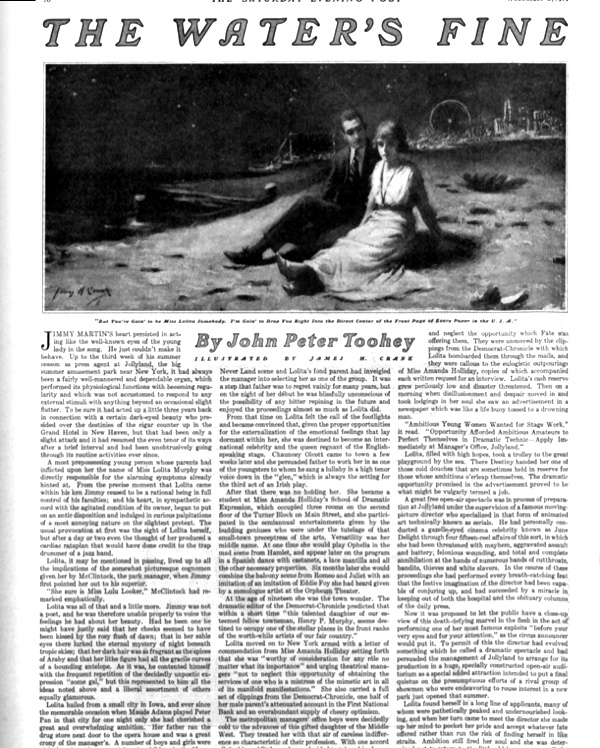
Featured image: Illustrated by James H. Clark / SEPS
North Country Girl: Chapter 58 — Jobless in NYC
For more about Gay Haubner’s life in the North Country, read the other chapters in her serialized memoir.
My second Michael, my second true love, had tossed me to the wayside; I was too much baggage for him to handle on his pilgrimage to New York City in pursuit of his art. I was rescued by my Minneapolis pal Mindy, who had been my travel companion on that fateful Spring Break in Mexico.
After years dedicated to serious partying, Mindy had finally given herself a good shake and found her way back to college; she was taking classes during the day and waitressing at night. Mindy’s roommate was gone for the summer, so I would take over her tiny bedroom until she came back.
I dropped my two suitcases holding all my worldly possessions, fell into Mindy’s arms, and had a good cry. Mindy blotted my face with her waitress apron and said, “It will be fine. You will be fine. No more crying.” I gave her a trembling smile as she headed out to work and ordered myself to do all my heart-broken sobbing in bed or in the shower, anywhere Mindy couldn’t hear me and pity me.
Most of the time Mindy was gone, off to class and work, and I was left alone in her small but light-filled apartment. I spent my first days sprawled weepy on the couch, all the more sorry for myself that I didn’t have a single one of Michael’s blues albums to listen and cry to, songs of betrayal and abandonment, of false-hearted lovers, songs that would let me wallow in my sorrow. Eventually I gave myself a good talking-to and ventured out into the only thing that could soothe my ruptured soul, my favorite thing in the world: a Minnesota summer, balmy languid days that last till nine, when the sun finally says good night and sinks away.
Mindy lived a short walk from my beloved, glorious Lake Calhoun (now known as Bde Maka Ska), a just-right-sized expanse of sky blue water dropped in the center of Minneapolis. Lake Calhoun was surrounded by the softest grass, the leafiest trees, and had a tiny sandy beach with a lifeguard chair, rowboats to rent, and a snack bar.

I could have registered for fall classes at the University of Minnesota, I could have looked for a job, but I was mesmerized by summer, as sweetly familiar as a favorite childhood book and as fleeting as a dream. Chicago summers had been all sweat and steam and stink; here in Minneapolis I could dip in the lake during the day and slip into a sweater at evening.
I read whatever magazines and books were lying about Mindy’s apartment, swam in Lake Calhoun, and tanned on that little stretch of sand, lunching on Popsicles from the snack bar. I watched couples making out on blankets and cried as only a jilted young lover can cry. I made sure there were chips and bread and cold cuts and six-packs of beer in Mindy’s fridge, and ignored my dwindling savings that I had no prospects for replenishing. I waited for the phone to ring.
The phone did not ring, but a three-page letter from Michael arrived. Most of it was on the wonders of New York City: The art museums, the Modern, the Guggenheim, the Whitney, and the Metropolitan where you could pay just a penny to get in. The subway, which, unlike Chicago’s El, actually took Michael everywhere he wanted to go, once he figured out the confusing lines and local versus express stops. The dozens of different languages Michael delighted hearing on the street every day, the sneaky thrill he got eavesdropping on the German or Russian or Yiddish speakers. His sublet’s neighborhood of Greenwich Village, where there were jazz and folk and blues clubs, and outdoor cafes on every corner.

It was the Summer of Sam, the summer of the Bronx burning, of the hot August night of blackout and looting, the summer New York City teetered on the edge of bankruptcy. Michael was oblivious to the dangers, the dirt, the looming disasters. “You would love New York,” Michael wrote, “and I miss you so much.”

I wrote back, mostly about how much I missed him, as I had no other news outside of what flavor Popsicle I had eaten for lunch. Our letters criss-crossed the country, full of love and longing. I read Michael’s letters aloud to Mindy, always a sympathetic ear, on the few nights we spent together. She sipped the beer I gratefully supplied and flipped through the magazines she never had time to read.
“You’re going to New York,” Mindy assured me. “Wouldn’t it be cool if you got a job here?” and she held up the latest issue of Viva magazine, with the pouting face of minor starlet Barbara Carrera on the cover.
As Mindy predicted, the long-distance call and the summons to New York finally arrived. I heard Michael sniffling, he had a catch in his voice. “I am so sorry, I don’t know what I was thinking of, I love you, I want to be with you, please come to New York. The place I’m staying in is really small, I’ll find someplace for the two of us, it’s going to be great, please say you’ll come.” A tsunami of joy washed over me and I started to cry too. I had missed Michael dreadfully. For weeks my mind and heart had been unmoored, drifting through the dark seas of rejection and loss. Now I was rescued, swimming toward a lifeboat of love, Michael holding out his hand to pull me in.
I opened my pink Samonsite suitcase to pack up the bikinis and cutoff jeans I had been living in, and there on the top was my modeling portfolio. I leafed through the acetates holding the garishly lit and cheaply printed photos of me in surgical scrubs or lounging on a hideous “Rent-to-Own” plaid couch or eating a McDonald’s Filet-O-Fish, my own mouth gaping like a bass, and knew I had zero chance of finding modeling work in New York. I had to get a job, and the two skills I had were waitressing and magazine writing.
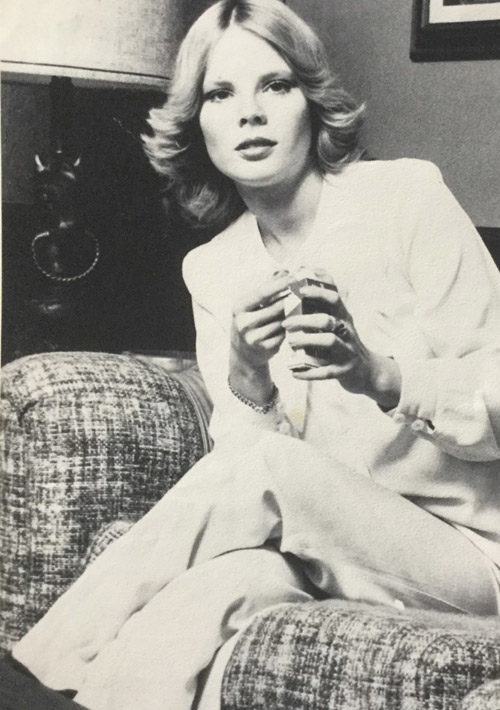
Under my modeling portfolio was a manila envelope with everything I had written for Oui. I sat on the floor and replaced all the photos of me with these short humor pieces and girl sets, placing the few that carried my byline at the front, and the most titillating girl-on-girl photos at the back of the portfolio.
A silvery bell of an idea popped into my head. I picked up the phone and called Los Angeles, mentally promising Mindy a few extra beers. I got my old Oui editor, John Rezek, on the phone and made quick work of the how-are-you small talk; it was long-distance daytime rates and I really didn’t care how much progress had been made on his epic poem about the first dog in space.
I said, “I’m moving to New York. I want to find a job at a magazine. Do you know anyone I can send a resume to?” John didn’t. He had never worked in New York. But Oui editor Gerald Sussman had, and he was standing right there. John put Gerald on the phone.
“Hi Gay, yeah listen, give Gordon Lish at Esquire a call. We’re great friends. Just mention my name and he’ll see you, help you out.”
Gerald’s connection at Esquire, the same magazine that had lured Michael to New York, was a good omen, a blessing on my next move to Greenwich Village and into what had to have been the Guinness World Record’s smallest studio apartment. It was in a brick building on West 10th Street, which confusingly runs perpendicular to West 4th Street. Michael’s sublet was a single room that held nothing but a convertible couch; we when unfolded the bed (which we did immediately) it took up the entire space, wall to wall. The bathroom had a shower, sink, and toilet you had to sit on sideways if you wanted to close the door. The kitchen was an alcove where a half-size two-burner stove and dorm fridge huddled against a sink, lit dimly by the apartment’s only window, which had never been washed and overlooked an airshaft. It was still the perfect cozy nest for reunited lovers, but if two people had to share it indefinitely, there would be knives at the throat. Michael said, “It’s just till the end of the month, then we’ll move into a bigger place.”
In the still light and sultry September evening, Michael walked me up Eighth Avenue to Chelsea, which was all bright, cheap Cuban-Chinese restaurants, a long-gone cuisine that specialized in ropa vieja and fried rice. All along the side streets, card tables, folding chairs, and wooden crates were set up for what Michael told me were never-ending domino games; each game had twice as many kibitzers as players. We turned left on 20th Street and threaded our way through the domino tables to the middle of the block. Michael held me by the shoulders and placed me on the far right of an iron gate to peer inside past the grey stone front building. “See the courtyard?” he asked. “We’ll be living in the carriage house in the back. It’s called a mews.” Carriage houses and mews sounded so romantic we had to hurry back to the love nest, promising ourselves that we would come back to dine at La Tas de Oro or Mi Chinata as soon as we could afford it.
Financially, we were running on fumes. I had left Chicago with $800, which had been drastically reduced by thank you groceries for Mindy, rowboat rentals, snack bar Popsicles, and a plane ticket to New York. Michael was broke; landing that Chelsea apartment (monthly rent $400, the same amount as James’ luxury high rise back in Chicago) had required two months’ security, plus electricity, phone, and cable, which Michael had balked at until he discovered that no television in Manhattan could get reception without it, and Michael needed old movies and the National League.
The day after our lovely, loved-filled reunion, I invested in a stack of likely magazines and a ream of typing paper, balanced my trusty Smith Corona on my knees, and started sending resumes and cover letters out into the void, addressed, as John Rezak had advised, to each magazine’s managing editor. While I typed, Michael perched next to me on the folded-up couch, drawing board across his lap, cross-hatching an illustration for the next Harry Crews column; this would bring in $250, which was exactly what Michael had to pay out in child support.
“I’ll waitress,” I told Michael. “I’ll waitress until I get a real job,” positive that within a month or two I would be snapped up by a magazine. It turned out that it was harder to get a waitress gig than land a job in publishing. Every Greenwich Village bar and restaurant recognized me on sight as a non-New Yorker, and therefore a rank amateur. I never even got to fill out an application. The manager would say, “Where was the last place you waitressed? Minneapolis?” as if my last job had been slinging goat curry in Karachi. I was even rejected at every single one of the Village’s coffee shops, whose owners thought delivering a fifty-cent cappuccino to a table was beyond my capabilities.

It took me a week of non-responses to my resumes and being given the bum’s rush at bars before I worked up the desperate nerve to cold call Gerald Sussman’s friend. I gave myself a pep talk: I could do this. I had banged uninvited on the doors of dozens of photographers. I had threatened a receptionist with a can of Reddi-Whip. I had smuggled drugs from Mexico! I could phone a perfect stranger and ask him for a job. I called Esquire and was connected to Gordon Lish, who like everyone else in the world back then, picked up his own phone. “Hello?” said a plummy voice. I took a deep breath.
“Hello Mr. Lish, my name is Gay Haubner and I was a writer for Oui and Gerald Sussman told me to call you to see if I could interview for a job at Esquire.”
I sounded like a squeaky cartoon mouse rushing through a nursery rhyme at a recital.
“Well,” Gordon Lish drawled. “Then I better see you. Come up tomorrow at eleven.”
News of the Week: Bad Jobs, Summer Books, and How to Talk Like a Soda Jerk
But What If I Want to Be a Disc Jockey?

It’s that time of year again, when CareerCast unveils its list of the best and worst jobs. While everyone in the technology or medical fields rejoices and sips champagne, everyone else reaches for the Advil and wonders where it all went wrong.
Here’s the list. Some of the top jobs include Genetic Counselor, Software Developer, and Information Security Analyst. Jobs at the bottom include Taxi Driver, Retail Salesperson, and (sigh) Newspaper Reporter. Though to be accurate, jobs like Newspaper Reporter or Writer or Disc Jockey/Broadcaster have never been secure or high-paying.
This brings up the obvious question: Do you go into a career you love, even if it doesn’t pay a lot and doesn’t have as much of a future, or do you put all that aside and just go into a career that’s growing and pays well? For people graduating from college right about now, there are probably a lot of factors to consider. What excites you the most? How much money do you want to make? And most importantly, how much did your parents pay for your college education, and will they be ticked off if you become a musician?
There’s a book from decades ago titled Do What You Love, the Money Will Follow. I’ve always wanted to believe that, but I think it’s more wishful thinking than anything concrete. Unless, of course, what you love doing is being an Information Security Analyst.
Read This!

We have a guide from Amazon to 10 great new books in every issue of the Post, and I thought I’d highlight six more you might want to read at the beach this summer. You don’t have to read them at the beach, of course. They’ll still work if you’re on your couch.
- Calypso, by David Sedaris. The acclaimed essayist is back with several stories on topics that range from playing board games on vacation to the suicide of his sister Tiffany.
- When Life Gives You Lululemons, by Lauren Weisberger. The author of The Devil Wears Prada (the movie version seems to be on at least one channel every single day, and I have to stop to watch if I come across it) is back with this sequel, which focuses on the Emily Charlton character (played by Emily Blunt in the movie version).
- Little Boy, by Lawrence Ferlinghetti. The poet says that this new novel is “not a memoir, it’s an imaginary me.” Ferlinghetti recently turned 99 years old, and Sterling Lord, the literary agent he first met in the 1950s, is 97.
- Lincoln’s Last Trial: The Murder Case That Propelled Him to the Presidency, by Dan Abrams and David Fisher. The legal analyst and co-author Fisher write about the 1859 Illinois murder trial in which Abraham Lincoln served as defense attorney and how it may have led to his presidential bid.
- Understudy for Death, by Charles Willeford. This crime novel, about a seemingly normal housewife who kills her family, hasn’t been in print in almost 60 years, and Hard Case Crime will release a new version in July. Willeford is also the author of Miami Blues and many other critically acclaimed crime novels.
- Flash: The Making of Weegee the Famous, by Christopher Bonanos. Bonanos wrote the terrific Instant: The Story of Polaroid, so I have high hopes for this biography about legendary New York City crime scene photographer Arthur Fellig.
Hello?

Every few months, I like to complain about smartphones. Sure, the technology is amazing, but I hate what it has done to us.
In this piece for The Atlantic, Alexis Madrigal says that, because a lot of people don’t even answer their phones anymore, telephone culture is disappearing. A lot of what he says is a bit foreign to me, like when he talks about not answering the phone or getting many phone calls. I still answer the phone — having just a landline helps — and if I’m busy or out of the house, I have an answering machine that picks up. It’s also odd that he talks about how he doesn’t answer the phone that much because as much as 80 percent of the calls he gets are robocalls, telemarketing calls, and other types of unwanted interruption.
I was struck by his use of the word phone, because he’s talking about his smartphone. When I say “phone,” I’m still referring to the landline in my kitchen. The generic term phone has become the default term for smartphones, because everyone assumes that everyone else has a smartphone. It used to be that everyone had a landline and a smartphone was the second phone. Now it’s the other way around (if they even have a landline at all).
The people that bug me are the ones who have voicemail on their smartphone but never listen to it. Here’s the scenario: I’ll call a family member to make holiday plans — I won’t mention who it is because it’s my sister — and get their voicemail. I’ll leave a detailed message. They call me back later and ask me what I was calling about. I’ll ask them if they listened to the message and they’ll say, “No, I just scrolled and saw that you had called.” So I have to repeat the entire message to them. I would suggest that these people either listen to their voicemail or get rid of it altogether. In this age of texting, social media, and email, I miss normal telephone conversations and interaction.
I also miss busy signals. That may sound weird, but I really do.
Burn One All the Way, and Check Out That Eighty-Seven and a Half

“Burn One All the Way” refers to a chocolate malted with chocolate ice cream, and “Eighty-Seven and a Half” is an attractive girl sitting at a table with her legs crossed. Those are just two of the many slang terms you’ll read about in this entertaining look from Atlas Obscura at the lost lingo of New York City soda jerks. There are many reasons I wished I had lived in the 1930s, ’40s, or ’50s, and this is one of them. Are there still soda jerks today? Maybe a handful somewhere, doing their thing.
You’ll never guess what “Scandal Soup” is. Come on, guess.
Changes for Miss America
“We will no longer judge our candidates on their outward physical appearance.”
That’s the word from Miss America Organization chairwoman Gretchen Carlson, and it makes me wonder what an “inward physical appearance” would mean. The organization thinks it might be sexist and out-of-date to still judge a woman on how she looks in a bikini and evening gown. Now the entire show will just be all of the contestants sitting at desks, taking the SAT. For the talent competition, they’ll be in jeans and a sweatshirt, performing surgery and figuring out algorithms. Well, not exactly, but Carlson says that they’re more interested in “what comes out of their mouths … when they talk about their social-impact initiatives.” Sounds like a fun show.
When the show airs on September 9, I’ll be curious to see if they really avoid judging the women on their physical appearance. Just because they’re not going to be in bathing suits doesn’t mean the contestants won’t be of a certain weight, a certain height, with nice hair and sparkling white teeth.
I think the question is this: Is it possible to be a feminist, to be a supporter of the #MeToo movement, and still want to see Miss America contestants in bikinis?
Roadside America for Sale
A miniature town opened in Shartlesville, Pennsylvania, in 1953. The creator, Laurence Gieringer, kept adding buildings, trains, and other features until it grew and grew and grew. His granddaughter still owns it, and CBS Sunday Morning visited the display this week. Fascinating.
This may be the first time I’ve ever wanted to be an inch tall.
RIP Kate Spade, Robert Mandan, Bernard E. Trainor, William Phipps, and Jerry Maren
Kate Spade was an acclaimed fashion designer known for her popular handbags and other clothing and accessories. She left the company in 2007 and had changed her last name to Valentine to distinguish the Kate Spade line from her new line of accessories, Frances Valentine. She was found dead in her New York City apartment on Wednesday. She was 55.
Robert Mandan was probably best known for his role as Chester Tate on the ABC comedy Soap. He also appeared on such shows as the Three’s Company spinoff Three’s a Crowd, Private Benjamin, and The Facts of Life, as well as many movies and plays. He died April 29 at the age of 86.
General Bernard E. Trainor was a veteran of the Korean and Vietnam wars who later became a military analyst for The New York Times, ABC, and NBC. He died last Saturday at the age of 89.
William Phipps appeared in dozens of movies, including Crossfire, War of the Worlds, Executive Suite, and Cinderella as the voice of Prince Charming. He also appeared in many TV shows, including The Life and Legend of Wyatt Earp, and did voiceover work in commercials. He died last Friday at the age of 96.
Jerry Maren was the last surviving Munchkin from The Wizard of Oz. He appeared in other movies, too, including Battle for the Planet of the Apes and the Marx Brothers’ At the Circus, as well as on TV on Seinfeld, The Gong Show, The Odd Couple, and in many commercials. He also founded the advocacy group Little People of America. Maren died in May at the age of 98.
Quote of the Week
This week’s quote is an entire obituary, and it deserves an OMG:
80-year-old Minnesota woman 'will not be missed' by children, according to scathing obituary https://t.co/qQqBjyksDA pic.twitter.com/qkl2RCFkSo
— San Diego Union-Tribune (@sdut) June 5, 2018
This Week in History
Shopping Carts Introduced (June 4, 1937)
The first carts were designed by Sylvan N. Goldman, owner of the Humpty Dumpty supermarkets in Oklahoma City, Oklahoma. Eighty-one years later and people still don’t return them to the carriage corral.
Frank Lloyd Wright born (June 8, 1867)
Here’s a terrific piece by Todd Wilkinson on the famed architect’s long and stormy career.
This Week in Saturday Evening Post History: Graduate (June 6, 1959)
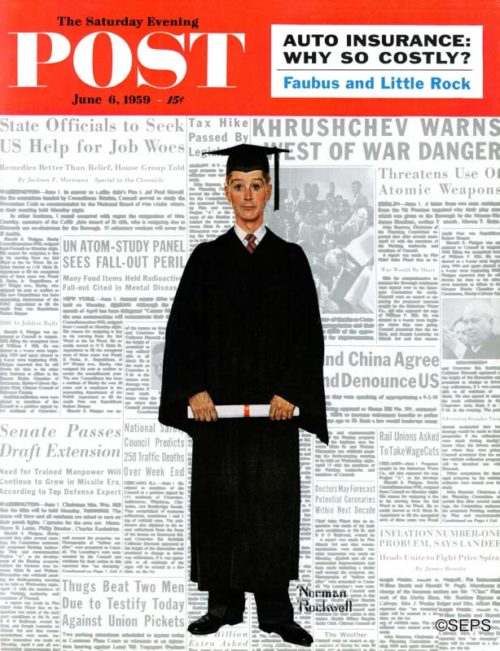
Norman Rockwell
June 6, 1959
We should update this classic Norman Rockwell cover, replacing the headlines in the background with more current stories and worries.
It’s National Steakhouse Month

What’s your favorite steakhouse?
My favorite — not that I’ve gone to a lot of them — was the Hilltop Steakhouse in Saugus, Massachusetts. It was a gigantic restaurant, at one time the biggest in the country, with a western theme and various rooms with town names (Dodge City, Sioux City, Virginia City, etc.). I was quite sad when it closed in 2013. It’s being replaced by a shopping center and another restaurant, but it won’t be the same.
One thing that remains is the giant iconic sign. It’s staying where it is and is even getting a makeover.
Next Week’s Holidays and Events
The Belmont Stakes (June 9)
If Justify wins, he will be the 13th winner of the Triple Crown (the Kentucky Derby, the Preakness, and the Belmont Stakes) and the first since American Pharaoh in 2015. The race airs at 4 p.m. ET on NBC.
One of the horses competing is named Gronkowski. You can’t even escape that guy at a horse race.
National Ballpoint Pen Day (June 10)
Some day our signatures will be replaced by fingerprints, retinal scans, or giving a blood sample at the supermarket register. Until then, I’m stocking up on pens.
News of the Week: A Simpsons Record, Tony Nominations, and the Search for Discontinued Snacks
636
I used to watch Gunsmoke. I wasn’t there at the beginning — it started in 1955 — but I did watch it in the early ’70s, and then the repeats. I wanted to be Marshal Dillon, shooting bad guys and then going to the saloon to hang out with Miss Kitty. For a very long time it was the longest-running scripted show in TV history (it ended in 1975), but now that record has fallen away.
The Simpsons is now the longest-running scripted show. Last week’s episode was number 636, which means they flew past the 635 episodes of the James Arness western, as well as Lassie, which lasted for 591 episodes in various incarnations.
That’s going to be a very hard record for another show to beat. Even if they brought Lassie back (which I’m surprised they haven’t done since people love dogs), it would still be hard to catch up to The Simpsons. They’ve been renewed for at least a couple more seasons, and since they’re a cartoon, it’s not like the actors are going to get tired of the roles.
SpongeBob Is Up for a Tony?
Another famous cartoon just made news, too. The Tony nominations were announced this week, and SpongeBob SquarePants: The Broadway Musical tied with Mean Girls for the most, getting a total of 12, including Best Musical, Best Book of a Musical, and Best Performance by an Actor in a Leading Role in a Musical (for Ethan Slater). Other nominees include Denzel Washington, Tina Fey, Amy Schumer, Laurie Metcalf, Andrew Garfield, and Nathan Lane.
Of course, this being an awards show, there were snubs, including Jimmy Buffett’s Escape to Margaritaville, which got a whopping … zero nominations. Sorry, Parrotheads!
The Man Who Designed Radio City Music Hall
The Tony Awards will air live from Radio City Music Hall on CBS on June 10. This segment from this week’s CBS Sunday Morning talks about the anniversary of the death of Donald Deskey, the man who designed the New York City landmark. But what’s even more interesting is that the advertising man designed the packaging for many products you probably have in your home right now.
Attack of the Giant Mosquito
The warm weather is here, and that means the bugs are back. (I killed a giant bee in my apartment this week, which was “fun.”) Just be glad you’re not in China, where they have these things.
https://twitter.com/nypost/status/990946897161609217?ref_src=twsrc%5Etfw
This is how every monster movie starts. A giant bug like this stows away on a ship, comes over to the U.S., and wreaks havoc.
For Sale

I’ve bought items on eBay in the past, usually out-of-print books and other collectibles. And there are many other things I can imagine buying on the site. It never occurred to me to buy food, though.
Apparently, people are selling discontinued candy and other snacks on eBay. Since they’re discontinued, they’re often fairly expensive. But if you have an urge for Surge or Cinnamon Spice Tic Tacs, and also have a couple hundred dollars to spare, they can be yours.
You can also buy candy from several retro/nostalgia sites, including Old Time Candy, Dylan’s Candy Bar, Candy Favorites, and The Vermont Country Store.
RIP Arthur B. Rubinstein, Paul Junger Witt, Charles Neville, Michael Anderson, Pamela Gidley, and Gertrude Jeannette
Arthur B. Rubinstein was a composer who wrote music for films such as WarGames, Blue Thunder, and Stakeout, as well as TV shows like Scarecrow and Mrs. King, The Wizard, and many documentaries. He died last week at the age of 80.
Paul Junger Witt was a producer of many TV shows, including The Golden Girls, The Partridge Family, Beauty and the Beast, It’s a Living, Soap, and Benson. He also produced the movies Dead Poets Society, Three Kings, Brian’s Song, and a movie that scared the heck out of me when I was a kid, Satan’s Triangle. He died last Friday at the age of 77.
Charles Neville was a saxophonist and co-founder of the Neville Brothers band. He died last week at the age of 79.
Michael Anderson directed such films as Around the World in 80 Days, Logan’s Run, Orca, The Quiller Memorandum, and the 1956 version of 1984. He died last week at the age of 98.
Pamela Gidley appeared in the movie Twin Peaks: Fire Walk with Me and was a regular on TV shows like CSI, The Pretender, Angel Street, and Strange Luck. She died on April 16 at the age of 52.
Gertrude Jeannette was not only an actress, writer, and director in film and on Broadway, she was also the first woman to have an official cab driver’s license in New York City. She died last month at the age of 103.
Best and Worst of the Week
Best: I really enjoyed this Sports Illustrated essay by Jack Dickey on what it was like to be a recent two-day champion on Jeopardy! He gives a lot of inside info on how the show is filmed (they do several episodes a day, so you have to change clothes) and what the contestants can and can’t do while they’re there.
Worst: Well, this is depressing. Apparently, British kids can’t tell time on analog clocks, so the schools there are getting rid of them and replacing them with digital ones. Actually, this isn’t confined to just Britain; it’s true in the U.S. too, as this segment from Jimmy Kimmel Live! shows.
This Week in History
New York World’s Fair Opens (April 30, 1939)
The Flushing Meadows fair was open for a year and a half, closing in October of 1940. There’s a time capsule still buried there that is going to stay buried until the year 6939. The Post is planning a special issue for the time capsule’s opening.
Empire State Building Dedicated (May 1, 1931)
The New York City landmark has 102 floors and was once the tallest building in the world. It was the site of a 1945 plane crash, and there was also that time in 1933 when a giant ape climbed it.
This Week in Saturday Evening Post History: Dieting Through Dessert (May 2, 1959)
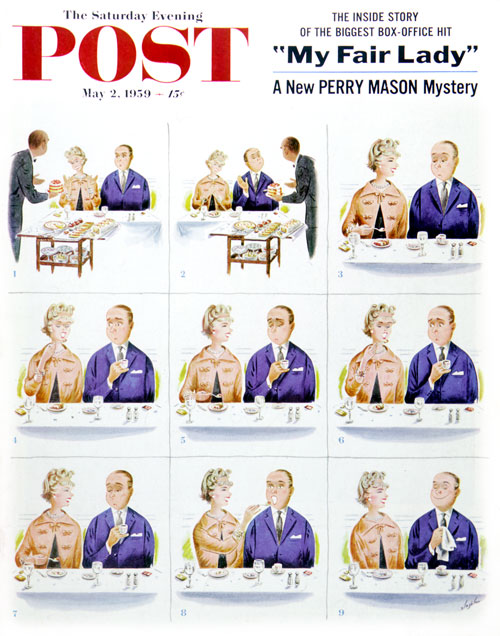
Constantin Alajalov
May 2, 1959
There aren’t many Post covers that feature nine different panels, but this one by Constantin Alajálov is an effective way to show how much the guy wants the dessert, which he finally gets a bite of in the last panel.
Post Writers You Should Read
By the way, the Perry Mason story featured in that issue was “The Case of the Mystical Monkeys,” in which Perry defends a secretary accused of murdering a Las Vegas gambler. The Post published many of Erle Stanley Gardner’s Mason stories, even before the TV series started in 1957. Here’s a bibliography of the Mason novels and stories, including the ones we published. Many of them were illustrated by James Bingham.
Desserts!
Continuing with our celebration of the above Post cover, Sunday is International No Diet Day. Now, for a lot of people, every day is “no diet day,” but this is the day when you have official (and international!) approval to not diet.
Here’s a recipe for Aunt Mary Ann’s Four-Layer Whiskey Cake, and here’s one for a cake that Mary Todd Lincoln made for her husband. I don’t think it has a name, but it is advertised as “the best in Kentucky.” And if you like bananas, here are several really old recipes, including Banana Pie, Banana Pudding, and the ever-popular Banana Cakes to Be Served with Meat.
Next Week’s Holidays and Events
Free Comic Book Day (May 5)
Comic books are one of those things that I put in the category of “I haven’t bought one in many years and I have no idea what’s going on with them but I’d like to get one again.” Saturday just might be the day to do that.
V-E Day (May 8)
It stands for Victory in Europe and it celebrates the day in 1945 that Nazi Germany surrendered to the Allied Forces.
Considering History: The Great Gatsby, Multicultural New York, and America in 1925
This series by American studies professor Ben Railton explores the connections between America’s past and present.
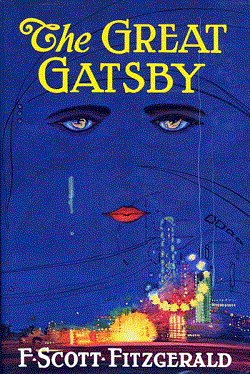
On April 10th, 1925, the first edition of F. Scott Fitzgerald’s novel The Great Gatsby was released in the United States. Originally published to mixed critical reviews and mid-level sales at best, over time Gatsby has become one of the most acclaimed and well-read American novels. It is often located close to the top of “Best of the 20th Century” lists, is a perennial contender for the elusive title of The Great American Novel, and is one of the most frequently taught texts in American classrooms. While Fitzgerald did not choose to go with the alternate title Under the Red, White, and Blue, there’s no question that his book has become closely linked to images of American identity and community—and to national narratives such as the American Dream.
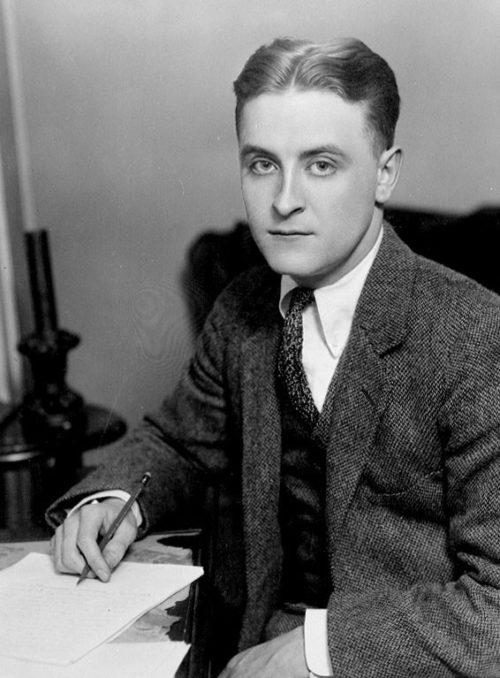
Fitzgerald’s novel is also closely connected with its time period and cultural moment, and specifically with images of the “Roaring Twenties.” The novel’s depictions of wealth, excess, recklessness, the interconnected cultures of alcohol and organized crime during Prohibition, and new technologies like automobiles and Hollywood silent films, have become synonymous with that era between World War I and the Great Depression. Yet while Gatsby certainly captures those historical and cultural contexts, there are many other sides to 1925 America that are much less central to its world. There are other books published in 1925 that can better connect us to those histories and add them into our collective memories of the era.
Perhaps the most striking historical absence from Fitzgerald’s novel is that of African Americans and the nascent Harlem Renaissance. As part of the first wave of what came to be known as the Great Migration, large numbers of African Americans had been migrating to New York City for more than a quarter-century, and the upper Manhattan neighborhood of Harlem was by 1925 one of the nation’s most vibrant African American communities. Many of New York’s white socialites were frequent visitors to and patrons of the jazz clubs, parties, and social events that came to embody the relationship between that Harlem world and the city around it. Yet despite its New York setting, Fitzgerald’s novel does not reference Harlem at all — indeed, the book’s only African American characters are a stereotypical trio of “three modish negroes, two bucks and a girl,” whom the narrator Nick Carraway observes in a passing car, “the yolks of their eyeballs roll[ing] toward us in haughty rivalry.”

Providing an important corrective to that absence is another ground-breaking 1925 book, The New Negro: Voices of the Harlem Renaissance. Assembled and edited by the philosopher, educator, and activist Alain Locke, The New Negro features a broad and varied collection of African American creative writers, scholars, historians, journalists, and visual artists, highlighting the wide range of forms, topics, and contexts to which this developing Harlem community had already connected. From the first published story by Zora Neale Hurston (who was about to enter Barnard College) to some of the earliest published poems by Langston Hughes, along with contributions from established authors and leaders such as James Weldon Johnson and W.E.B. Du Bois, The New Negro reflects a burgeoning African American, New York, and national community that existed alongside Gatsby’s world but offers a very different side to America in 1925.
In the political realm, many of the most prominent and divisive 1925 debates focused on the interconnected topics of immigration and national identity. Coming at the culmination of a four-decade period of particularly significant waves of immigration, the 1921 Emergency Quota Act and 1924 Quota Act had enshrined exclusionary, white supremacist attitudes in national immigration law. As South Carolina Senator Ellison DuRant Smith put it in a Senate speech in support of the 1924 law, “It seems to me the point as to this measure … is that the time has arrived when we should shut the door. … Thank God we have in America perhaps the largest percentage of any country in the world of the pure, unadulterated Anglo-Saxon stock … and it is for the preservation of that splendid stock that has characterized us that I would make this not an asylum for the oppressed of all countries.” Debates over these laws and policies, and whether for example to extend them to immigrants from Mexico and other Western Hemisphere nations (initially not included in the 1924 Act), continued throughout the remainder of the decade.
Fitzgerald’s novel does include such a white supremacist and xenophobic voice in the character of Tom Buchanan, and particularly his unhinged Chapter 1 rant about how “civilization’s going to pieces” and “if we don’t look out the white race will be—will be utterly submerged.” Tom is as close as the novel has to a villain, and by linking him to these bigoted views Fitzgerald certainly makes a clear point about those national debates. But although New York City was one of the most consistent destinations for the era’s immigrant arrivals (and had been since the late 19th century), Gatsby does not feature any overtly immigrant or even particularly ethnic American characters. Indeed, its only such minor character is Meyer Wolfsheim, the “small, flat-nosed Jew” to whose illicit and criminal activities Jay Gatsby is connected in unclear but unsavory ways and who is at best a stereotypical character of Jewish and Jewish American identity.
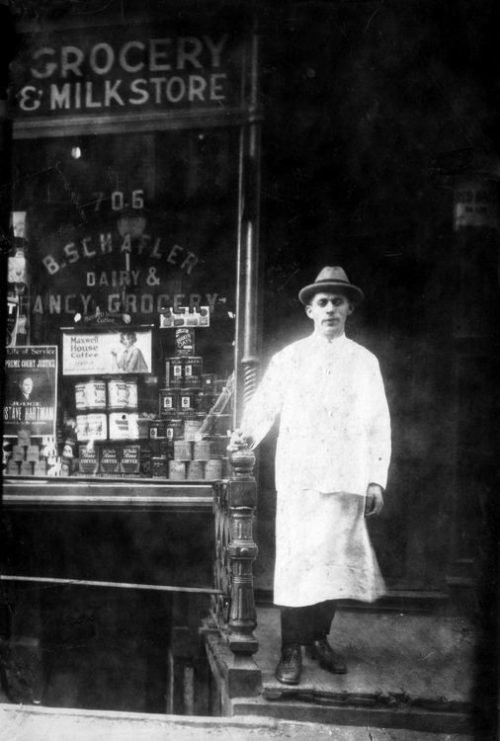
To read about the very distinct images of Jewish immigrants to New York City and Jewish American identities, read Anzia Yezierska’s Bread Givers. This compelling and ground-breaking 1925 novel offers is narrated by Sara Smolinksy, the daughter of Polish Jewish immigrants whose perspective and story we follow from age 10 through her graduation from college and subsequent professional and personal developments. Through Sara’s eyes we see the challenges facing a multi-generational Jewish American immigrant family (with a father determined to maintain his role and identity as an Orthodox Talmud scholar), the communal setting of the Lower East Side’s tenements, and the possibilities and limitations of assimilation into American society for a second-generation immigrant such as Sara.
On the anniversary of Gatsby’s publication, adding books like Bread Givers and The New Negro to our reading list can only help contextualize and expand the world and meanings of Fitzgerald’s classic novel.
Class of ’41: A Mother’s Secrets Revealed
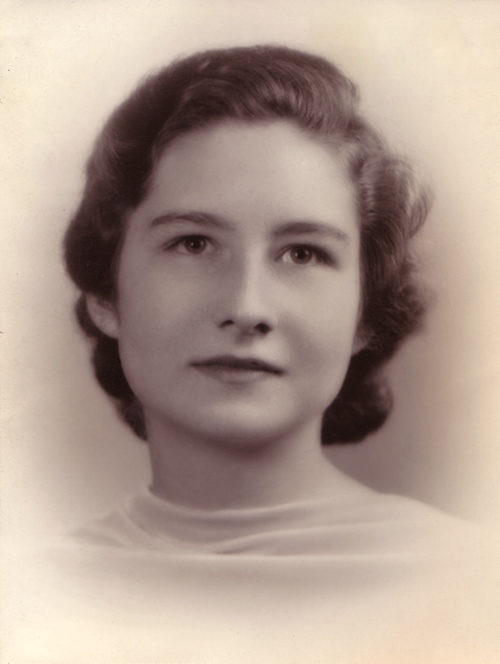
In 2001, on a beautiful spring weekend, I accompanied my mother to her 60th college reunion and got a picture of the young woman she once was.
Thursday, 11:45 p.m. Leftovers
I am visiting my mother at her New York City apartment. Tomorrow, we’ll begin a full weekend of activities for her Vassar College reunion in Poughkeepsie, just an hour and a half north of the city in a chartered bus. We’re sipping beer, and she’s telling stories about old friends and cherished college moments. Finally it’s bedtime.
But first, we must boil the strawberries.
“They could go bad,” she explains, dumping the clinging dregs from the green plastic pint container into a saucepan.
My mother, Jean, is a lot of things — fiercely intelligent, archly funny, and sometimes a bit nutty — but she is never wasteful. She seals up her strawberry mush in a recycled mayonnaise jar, puts it in the fridge. Then she climbs up on a step stool and roots around in an overhead cabinet until she finds another container. Into this one goes a cup of coffee left over from dinner.
Friday, 11 a.m. Some Kinda Wise Guy
The cab driver who’s taking us to Midtown to catch the Poughkeepsie bus is one of those garrulous New York City cabbies out of central casting. I happen to mention we’re going to my mother’s college reunion, and he replies, “But she can’t be your mother. I thought she was your sister.” I roll my eyes, but my mother gets right into it with him: “Well, if your eyesight is so bad, maybe you shouldn’t be driving.”
He clams up for the rest of the ride.
Friday, 3 p.m. The “Ma-Ma” Degree
The reception for the class of ’41 is in a large central dormitory and administration building simply called “Main.”
The room for our reception is grand, with high ceilings and walls decorated in an ornate jade Chinese wallpaper of geese and lily pads. Lest we forget where we are, foot-high golden Vs are tucked into the molding in the four corners of the room.
I meet one of my mother’s classmates, Marta, who is extremely pale and so thin you want to reach for her arm when she stands or takes a step. Her blue eyes are sharp. She tells me about coming to the U.S. from Austria right before the war. How frightened she was the time she heard a fellow shopper in a New York department store loudly criticizing Roosevelt. “Back home, you could get shot for saying such things,” she says.
Marta also tells me another story that I will hear echoed over the next two days. Graduating as a science major, she wanted to study aeronautical engineering. She was told she qualified for acceptance to Polytechnic Institute of Brooklyn, but administrators warned her it would be “difficult” for her there, since there were no toilet facilities in the labs for women. “So instead of an M.A.,” she tells me, “I became a Ma-Ma.”
This was not, it hardly needs to be said, an era when women easily became professionals, even those who were college graduates. Consider the statistics for the class of ’41: Only one-fourth worked outside the home for a full 20 years. Of 252 graduates, 166 described their roles as “chiefly housewife.” More than half reported doing regular volunteer work. And of the 74 who’d held full-time jobs, more than half were, like my mother, teachers.
Another occupation has become more common in recent years: caregiver. My mother was nurse to her mother and, later, to my father, who had Alzheimer’s. It was no easy task, but I never heard her utter a single word of complaint.
One woman tells me she visits her husband in a nursing home all day, every day, even though he no longer recognizes her. “My friends told me I shouldn’t go so much,” she says. “So for a few days I stayed away. When I came back, the nurse said he’d stopped eating. So now I go.”
We are interrupted by Judith, a vigorous woman in a bright red dress who is breathless with excitement. “Do you want to see my diamond pin?” she asks.
“Okay, sure,” I say politely.
The joke is on me. She opens a jewelry box and shows me a dime and a safety pin. Should have seen this coming: Judith is wearing huge red earrings, one says IN and the other says OUT.
Friday, 8:30 p.m. Continuity
My mother has something to tell me. We’ve just finished a buffet dinner under a white tent, sitting with her very dearest old friends, many of whom she’s kept up with through the years. They’ve updated each other on travels, aches, medicines, children, grandchildren, husbands. We pass around the script for a skit, written mostly by Ruth, a professor’s wife, that they’ll perform at tomorrow night’s banquet. The topic is language, words that have disappeared (rumble seat, nylons) and words that have gained common currency but still feel alien and amusing to them (user-friendly, glass ceiling, significant other).
The subtext, of course, is change, something that’s on my mother’s mind a lot lately. But as we’re sipping coffee, she leans over and tells me something that is about not-change — her theory of continuity.
Memories can be handed down from generation to generation, my mother believes. When she was very young, her grandmother lived with her in their New York City apartment. My mother would regularly brush out her grandmother’s long hair. And while she was doing it, her grandmother would describe brushing her own grandmother’s hair. This earlier brushing took place in New Milford, Connecticut, where the family had lived for generations. It was a town my mother knew well. And so, she says, her grandmother’s memory eventually became her own. She describes for me the sun coming in the south-facing window of the sitting room in her grandmother’s childhood home, the feel of the wooden bristle brush in her grandmother’s five-year-old hands. As she describes it, she closes her eyes, and I can see she’s really there, brushing her great-great-grandmother’s hair. I do a little calculation: The scene she’s depicting would have taken place in the 1850s.
Friday, 11:30 p.m. “It’s Ther-a-peu-tic”
My mother and four friends have passed up the obvious option of going to bed. Instead, we’re squeezed around a table at the Mug, a basement campus pub. It’s packed with young men and women, recent graduates sharing their own reunions. (Vassar went coed in 1969.) Donna Summer is pulsating from large speakers. Margaret, one of our crowd, is dancing exuberantly by herself. (As a girl, she was considered clumsy, she tells me. So she was sent to study dance with a disciple of Isadora Duncan, and she’s been dancing ever since.) She insists that we all join her on the crowded dance floor. The six of us gather in a circle. We dance. Ruth, who’s tall and slim but not what you’d call athletic, makes determined up-and-down moves with her fists. My mother, whom I’ve never seen dance to rock, much less disco, gamely shuffles her feet a bit in time to the music. “Come on,” Ruth shouts to her, pumping her hands up and down. “It’s ther-a-peu-tic!” My mother smiles a wry smile and pumps her hands, just a little.
Later, as I’m fighting my way through the dense crowd, ferrying clusters of full beer mugs from the bar to our table, a woman with a “Class of ’96” badge blocks my path and demands, “What year are they?”
“Class of ’41.”
“Awesome!” she squeals.
Saturday, 7 p.m. An Old Memory Made New
The banquet dinner for the class of ’41 begins with a remembrance of classmates who have died. The names, more than 100, are listed on a program. I am struck by how unemotionally this tribute is received. Of course, by a certain age, death might be a familiar presence, I think to myself.
But then the speaker says, “… And, I’m sorry to report that since the printing of this list, two more of us have passed away.” A gasp punctuates the silence as she names the newly dead.
After dinner, my mother and her friends stand and perform their skit. It begins as a series of comments about life in 1941 (“I’ve never seen TV, but I’ve heard of it.”), then flashes forward to 2001, when, according to Ruth’s script, most young people are pretty clueless:
“Do we know where the trade winds are? Or how to find Oslo and Shanghai, Kinsale and Petra?”
“Yes.”
“But our grandchildren don’t.”
“They know Planet Krypton, but they can’t find Crete.”
There’s more in this vein. Then comes the closing line, which draws a good laugh: “You just can’t trust anyone under 80!”
Suddenly, I see them as they were in their early 20s, beautiful, privileged, exquisitely well-educated. I can imagine them putting on a skit like this one — witty and satirical and just a little bit smart-alecky. Each of them is intimately acquainted with the lessons of the Depression. Most of them expect to go forth, marry, and raise children. The European war has already begun; in a matter of months, it will become America’s war too. And so my understanding of my mother’s precious years at college now includes a living picture. She has given me the gift of a memory. She has given me a piece of her life.
Steven Slon is the editorial director for The Saturday Evening Post. Jean Slon passed away in 2008.
This article appeared in the May/June 2018 issue of The Saturday Evening Post. Subscribe to the magazine for more inspiring stories, as well as art, travel, trends, fiction, and features from our archives.
News of the Week: Geoffrey Fired, Mockingbird Killed, and Unicorn Dip Is Better Than It Sounds
Toys ’Rn’t Them Anymore
I still remember that commercial. I don’t just remember it in a vague way, the general way you might remember something from decades ago, or a feeling you remember more than specific details; I remember everything about it. When I found it on YouTube, I realized that I instantly knew the lyrics word for word, the various scenes, and how they synced with the music, with no struggle to jog my memory whatsoever. That’s either impressive or scary, I’m not sure which, but for some reason it’s embedded in my brain’s hard drive.
So I was a little sad when I heard this week that Toys ’R’ Us is filing for bankruptcy and closing its stores. Thanks to places like Walmart, Amazon, and Target, the iconic chain just couldn’t compete.
It’s probably a little silly to be sad and nostalgic about the closing of a chain of stores, especially ones you haven’t shopped at in many years (which means I was part of the problem, though in my defense, I no longer buy toys), but it’s a special memory for me, and a place and time I consider mental comfort food.
I hate to see brick-and-mortar stores vanish. Do we really want to live in a world where every single thing we do, from the moment we get out of the shower to the time we go to bed, is done online? Everything we buy, everything that entertains us, everything we experience?
I also hate to see Geoffrey out of work. It’s not easy for a giraffe to find another job, at least not one his age.
Killing Another Mockingbird
I didn’t realize that there was a Broadway version of Harper Lee’s To Kill a Mockingbird in the works, and I didn’t realize that West Wing creator Aaron Sorkin was writing it. Lee’s estate knew about it, however, and they’re suing to stop it.
The lawsuit argues that the show is too different from the novel and violates a contract between Lee and the show’s producers that made sure the script wouldn’t stray far from the characters, plot, and tone of the novel. One of the changes the estate is worried about is the depiction of Atticus Finch, who they say is shown at first as a “naive apologist for the racial status quo.”
I wonder if the Mockingbird follow-up, Go Set a Watchman, will figure into the case. Fans of the original novel were also upset at how Finch was depicted in that book.
Snuggie News
Did you buy a Snuggie years ago? Not the Slanket — that was a completely different robe/blanket thing — but a Snuggie. If so, you might be entitled to a refund.
Allstar Marketing Group settled a $7.2 million lawsuit brought by the Federal Trade Commission last week for false advertising. It seems that even though the company was advertising the Snuggie as “buy one, get one free,” they were charging more money than customers thought and didn’t disclose certain additional fees. Customers are going to get an average of $33.14 back.
I have an idea for a product I call the Snop. They’re sneakers with cleaning pads attached to the bottom, so you can mop your floor while you walk around. Investors can email me.
Desk Jobs vs. Physical Labor
I love washing dishes. I don’t mean I enjoy loading dishes into a dishwasher — I haven’t had one of those in 25 years — I mean I actually like manually washing dishes. I also like folding laundry. It’s not something I’d like to do as a career, but it calms me down and helps me think. It’s good to do something during the day that doesn’t involve looking at a screen, tasks and chores that you can complete and consider little victories.
And I’m not the only one who feels that way. CBS Sunday Morning had an intriguing episode this week about the mind, and in one of the segments, they compared desk jobs to physical labor, with some interesting results.
By the way, just so we’re clear, I don’t want to wash your dishes or fold your laundry. I’ll do it for myself, but I’m not looking for any outside work, thanks.
Unicorns: They’re Grrrrrrreat!
Yesterday was a Kellogg’s day. I didn’t eat any cereal, but I did read Howard Markel’s great piece in the current issue of the Post on how the Kellogg brothers changed that industry forever. After reading it, I found out that Kellogg’s has a new cake-flavored cereal out called Unicorn. By all accounts, it seems to basically be Froot Loops, only with some sort of magical white unicorn dust on top. You better grab it online or at your local store, because it’s selling out quickly. Maybe you can sample it at the Kellogg’s restaurant in New York City. Yes, there’s a Kellogg’s restaurant in New York City.
Note: No actual unicorns were harmed in the making of the cereal.
RIP Kate Wilhelm, Nokie Edwards, Ken Flach, and Betty Ann Bowser
Kate Wilhelm was an acclaimed author of science fiction and mystery books. With her husband, writer Damon Knight, she ran the Clarion Writers Workshop for decades. She died March 8 at the age of 89.
Nokie Edwards was the lead guitarist for the Ventures, famous for such songs as the theme to Hawaii Five-O, “Wipe Out,” and “Walk, Don’t Run.” He died last week at the age of 82.
Ken Flach was a professional tennis player who won a 1988 Olympic gold medal, two Wimbledon Championships, and a U.S. Open with his partner Robert Seguso, plus another U.S. Open with Rick Leach, and even the mixed doubles championships at Wimbledon and the French Open with Kathy Jordan. He died last week at the age of 54.
Betty Ann Bowser was a veteran journalist who started in local television in 1966 and went on to work at CBS News and on PBS NewsHour. She died last Friday at the age of 73.
Quote of the Week
From Bob’s Burgers writer Kelvin Yu, about Facebook’s data privacy scandal:
In retrospect, it might have been a mistake to give Facebook all of my personal information in exchange for seeing what my high school friends eat for dinner
— Kelvin Yu (@InternetKelvin) March 20, 2018
The Best and the Worst
Best: This week’s episode of The Simpsons was a takeoff of the 1970s TV show Banacek, renamed here as Manacek. What was great about it was that it wasn’t really a Simpsons episode that had Manacek in it; it was more a Manacek episode that had the Simpsons in it. Take a look at the re-creation of the Banacek opening the show did and compare it to the original.
Worst: This is another story from CBS Sunday Morning (hey, it’s a good show!). Vint Cerf, tech legend and an architect of the web, says that digital media like CDs, DVDs, and the equipment they’re used on will eventually go away and stop working. If I were you, I’d start making copies of everything you own and maybe even printing everything out on paper.
This Week in History
Grover Cleveland Born (March 18, 1837)
Cleveland is the only U.S. president to serve two non-consecutive terms, from 1885 to 1889 and 1893 to 1897. He also kept a really big secret.
“Who Shot J.R.?” Episode of Dallas (March 21, 1980)
It’s hard to believe now, in this age of daily spoilers and leaks, but there was a time when you actually didn’t know what was going to happen next on your favorite TV show. When J.R. Ewing was shot, it created a national pop culture frenzy, with fans spending the summer trying to guess whodunit. The show actually filmed several different solutions in case word got out. (Spoiler alert! It was Kristin.)
This Week in Saturday Evening Post History: Fifth Avenue (March 19, 1960)
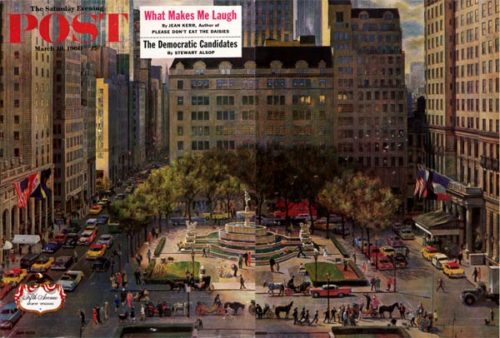
March 19, 1960
Not every Post cover was a big two-page fold-out, which is just another reason to love the terrific work by John Falter. I don’t know how he created such beautiful, realistic detail in his paintings, but he has always been one of my favorite Post artists.
Post Writers You Should Read
This is a new, once-in-a-while feature, where I’ll talk about great writers you might not know much about who have written for the Post. First up is someone mentioned on the cover above, Jean Kerr.
Jean Kerr was an essayist and playwright probably best known for her essay collection Please Don’t Eat the Daisies, which was made into a 1960 movie starring David Niven and Doris Day. Kerr’s plays include The Song of Bernadette, Lunch Hour, and Mary, Mary, which remains one of the longest-running shows of all time. She was a fantastic writer, part Erma Bombeck and part E.B. White, writing mostly about her kids and life in suburbia.
You can read Please Don’t Eat the Daisies for free — that’s right, for free! — at the Internet Archive. One of the pieces in the book, “Where Did You Put the Aspirin?” was originally written for the Post under the title “Children Really Are Not People.”
Today Is National Chip and Dip Day
I agree with Puddy on Seinfeld when he opined that chips and dip can be a meal and not just a snack. Tonight, instead of the usual pizza or steak and salad or chicken with vegetables, how about this Spinach-Artichoke Dip, this Caramelized Onion Dip, or this Nashville Hot Chicken Dip? And if you plan on having a regular meal tonight, maybe you can have a dip for dessert, like this Unicorn Dip.
I really didn’t know there were going to be so many unicorns this week.
Next Week’s Holidays and Events
Earth Hour (March 24)
Specifically, that hour is 8:30 to 9:30 p.m., whatever your time zone in the world.
Palm Sunday (March 25)
This is the day Christians “commemorate Jesus’ triumphal entry into Jerusalem.” Good Friday, the day of his crucifixion, is next week.
Weed Appreciation Day (March 28)
I know what you’re thinking, but it refers to the other kind.
News of the Week: More Snow, Cloned Dogs, and the Wild, Exciting World of Celery
Winter’s Not Done Yet
I just looked out my window and it’s a wet, gray, early March day. I didn’t mean for that to rhyme; I just wanted to describe what it looks like outside my window.
I’m actually now in “spring mode,” ready to wear lighter clothing and put the shovels away, but winter isn’t finished with us quite yet. We just had a nor’easter that gave us a ton of rain and winds and damage to coastal homes, and tonight and tomorrow we’re supposed to get hit with another storm. This time more snow will be involved, anywhere between 1 and 12 inches, depending on where you live.
This is what I find funny about weather forecasts now: they have so much information that, in a way, they’re less accurate. A typical snowstorm forecast will go something like this:
“The European computer model says we’re going to get hammered by this storm, with over a foot of snow. The American model says we’re going to get only an inch or two. Then this third model says that we’re going to be somewhere in the middle, maybe four to six inches. We’re still collecting data, but that’s our best guess right now. Back to you, Ed.”
That’s a great forecast. I could have told you the same thing sitting on my couch in my sweatpants. But they used the word computer and showed a lot of Doppler radar images, so I guess we better pay attention to it.
People … People Who Need Cloned Dogs
I love dogs more than I love some people I know, but I’m not sure I could ever do this. Barbra Streisand cloned her dog. She wrote about it for The New York Times.
Streisand had her dog Samantha for 14 years, and just before the dog died, the vet scraped the inside of her cheek to get her DNA. The singer has a friend who did the same thing with his dog, and she wanted to try it to see if it would work. And it certainly did. It produced five puppies, three of which she kept and two she gave away.
It’s a little too sci-fi for me. I have this vision of an army of cloned little dogs taking over the planet. But I’m happy that Streisand is happy.
By the way, for the title of this section, I almost went with “Send in the Clones.”
Chiweenie
Every year I like to point out new words that are added to the various print and online dictionaries, even if sometimes they aren’t words at all. The Merriam-Webster Dictionary is my favorite. I just bought a brand new one because my old one vanished somehow, and it’s perfect timing, because this past week they announced some words that were added to the classic tome. And when I say “some” words, I mean 850.
Some of the new words and phrases include wordie (a lover of words), chiweenie (a cross between a Chihuahua and a dachshund, even if they’re not cloned), hate-watch (where you watch a movie or TV show even though you know it’s bad), and dumpster fire (which is defined as “a disastrous event,” though I’ve seen it used to mean a series of disastrous events, or just an overall definition of how things are going).
They’re also now including mansplain, but to be honest, I’m a little afraid to tell you what that is.
Mister Rogers’ Neighborhood at 50
To celebrate the 50th anniversary of Mister Rogers’ Neighborhood, PBS is airing a special this week titled It’s You I Like. It focuses on what Fred Rogers and the show meant to various people, including John Lithgow, Whoopi Goldberg, and Yo-Yo Ma. It’s hosted by Michael Keaton, who got his start in pictures as a crew member on the show. Here’s a preview:
The Razzies
Everyone knew who was going to win the Best This and That at the Oscars this year — the results were fairly predictable — but who won the awards for the Worst of the Year? The Golden Raspberry Awards, or Razzies, are held the day before the Oscars every year, and this year’s list of “winners” includes Tom Cruise for Worst Actor (The Mummy) and Tyler Perry for Worst Actress (Boo 2! A Madea Halloween), and The Emoji Movie was named The Worst Movie of the Year. Other people who won Razzies include Mel Gibson and Kim Basinger.
Oddly, the winners didn’t show up to accept their awards.
RIP Roger Bannister and David Ogden Stiers
Roger Bannister was the first person to break the four-minute mile, which he did on May 6, 1954. He later had a career as a neurologist. He died Saturday at the age of 88.
David Ogden Stiers was an actor best known for his role as Major Charles Emerson Winchester on M*A*S*H and for voice work in many animated films. He died Saturday at the age of 75.
Quote of the Week
“Now there are so many young people, and all my old friends are dead. They have either drunk themselves to death or they have naturally popped off the vine.”
—actor Christopher Plummer, on how the Oscars have changed
The Best and the Worst
Best: I’m cheating a little because this isn’t from this week, but I didn’t see it until this week, so it still counts, right? It’s a letter that New Yorker writer Alexander Woollcott sent to Ira Gershwin, and is now posted at Argosy Books in New York City. My favorite part is where he manages to tell Gershwin that he hopes he fries in hell, but still signs it “affectionately.”
Letter from Alexander Woollcott to Ira Gershwin, on display outside the Argosy Bookstore, New York. pic.twitter.com/wmtC2LGeP9
— southpaw (@nycsouthpaw) February 20, 2018
Worst: Just one last thing about the Oscars. Every year they have an “In Memoriam” segment, aka the “What People Are They Going to Leave Out This Year?” segment. Sure, it’s hard to pare down hundreds of people into a few dozen, but they’re making a decision about who to include and who not to include. This year they left out John Mahoney, Tobe Hooper, Powers Boothe, Dorothy Malone (who actually won an Oscar!), Adam West, John Gavin, Dina Merrill, Michael Parks, Jean Porter, Richard Anderson, Anne Jeffreys, and Michael Nyqvist, among many others — but they included people like a hairstylist and a public relations guy. I’m sure they were lovely people, but don’t tell me you don’t have time to include Rose Marie, a woman who was in the movies and television for 90 years, if you are going to include people movie fans have never heard of before.
This Week in History
Alexander Graham Bell Born (March 3, 1847)
The man who invented the telephone in 1876 would often greet people with a “Whoo-hoo!” when talking to them on the phone. Today, he’d probably just text an emoji. Here’s a Post piece from 1900 on how to use the telephone, and here’s Ron Carlson’s essay on why he wants the landline to stick around forever.
Barbie Introduced (March 9, 1959)
Next year will mark the 60th anniversary of everyone’s favorite doll. This month, Mattel is releasing new dolls to honor Amelia Earhart, Frida Kahlo, and other inspiring women.
This Week in Saturday Evening Post History: Freedom from Want (March 6, 1943)
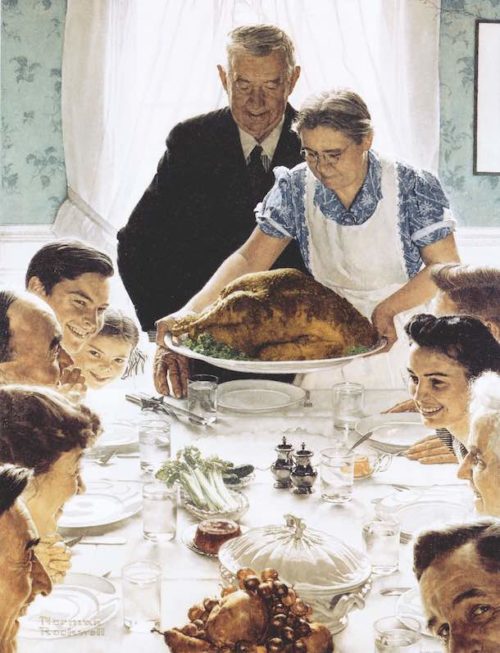
The Post asked four writers to craft essays to accompany Norman Rockwell’s Four Freedoms paintings. Poet Carlos Bulosan contributed the essay for Freedom from Want.
The painting has to be one of the most parodied in history, with everyone from The Simpsons, superheroes, and the cast of Modern Family replacing the original family.
March Is National Celery Month
I think we can all agree there isn’t a more exciting food than celery! It’s light green! It’s mostly water! It doesn’t have a lot of flavor! Did I mention it’s mostly water?!
Okay, no matter how many exclamation points I use, I can’t get you pumped up for celery, but I happen to really love it (and not just with peanut butter spread on it). Here’s a recipe for Easy Homemade Chicken Salad from Genius Kitchen, which sounds good, though I think they might be overdoing it with the mustard, green peppers, and hard-boiled eggs. Here’s a simpler recipe from the same site.
I’ve noticed a lot of recipes include water chestnuts, but I wouldn’t go that route either. I do like white pepper in mine and maybe even some grapes. Yes, grapes.
Next Week’s Holidays and Events
Daylight Saving Time begins (March 11)
I hear there are people who like it when it stays light until 8 or 9 p.m. I’m not one of those people, but I know they exist. Set your clocks an hour ahead before you go to bed.
National Girl Scout Day (March 12)
How can you celebrate the day if you’re not a Girl Scout yourself? By purchasing some cookies, of course. I like the Samoas, which apparently are now called Caramel deLites.
The Art of the Post: Painting the Human Circus
Few illustrators could paint the human circus the way Albert Dorne did.
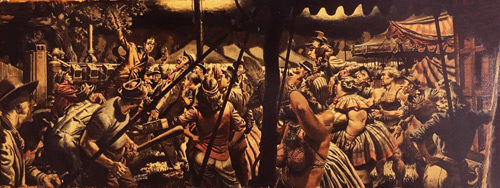
Click to Enlarge.
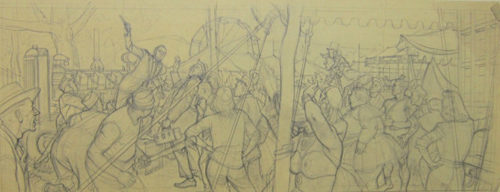
Click to Enlarge.
His illustrations were famous for their parades of colorful and scruffy people—geezers, yokels, oddballs, street urchins, con men, jilted lovers, and lowlifes.

Click to Enlarge.
His sharp eyes noticed and captured a wealth of details—wrinkles, lumps, warts, patches, and folds.
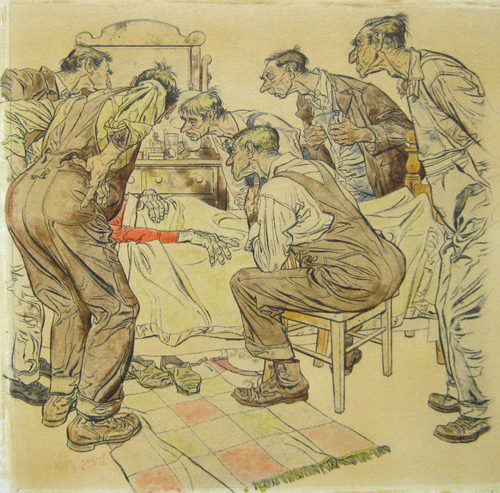
Click to Enlarge.
He was a keen observer of human nature and entertained readers with a front row view of humanity that few had seen before.
How did he understand this world so intimately?
Dorne was born in 1904 in the slums of New York City. His father abandoned the family, leaving Dorne’s mother alone to feed Albert and his three siblings. Dorne’s childhood was wracked with the diseases of dire poverty and despair: anemia, malnutrition, heart ailments, and tuberculosis. More than once, city health officials intervened to remove Dorne from his home and place him in a city sanatorium. By the time he turned nine, the boy realized that he needed to take desperate measures if he was going to escape the slums. Public school seemed like a dead end, but he thought he might have a chance to bring in a little money by selling art.
Dorne began sneaking away from school and spending time in New York’s free museums where he could learn about making pictures. By age ten, Dorne was skipping school two or three days a week. He was frightened to death that the truant officer would find him and took elaborate steps to avoid being caught. His favorite hiding place was the Metropolitan Museum of Art; he later claimed to have taught himself by copying every piece of art in the museum (including the armor and the sculptures). Museum guards took a liking to their small visitor, and soon he became the youngest person ever to receive a permit to draw and paint in the galleries.
In the seventh grade, Dorne stopped going to classes altogether. He felt that as the eldest son, it was his responsibility to support his family. It later turned out that Dorne didn’t even need to hide from the truant officer. His teachers had caught on to what he was up to and agreed among themselves not to turn him in. They admired his pluck and believed his chances for a decent life were better at the museum than they were at school.
Dorne first found a job selling newspapers on street corners. Most paper boys picked corners with the heaviest traffic, but Dorne shrewdly calculated that if he sold papers in front of a fancy restaurant, he might have fewer customers, but he could still make more money because customers who just enjoyed a fine meal were more likely to be big tippers. His plan worked. Before he turned 12, he had staked out four other strategic locations and hired his friends to staff them.
While he worked as a newsboy, Dorne continued to look for more work. He sometimes held three jobs at once. He became a milkman’s helper, an office boy for a chain of movie theaters, a shipping clerk, a salesman, and a loading dock worker. He painted faces on porcelain dolls on a factory assembly line and when he turned sixteen he even became a prizefighter. (After all, Dorne reasoned, he had been involved in street fights with gangs while growing up in the ghetto and had done pretty well.) As a boxer, he won ten consecutive matches before he was knocked out cold by a tough professional fighter. Dorne quickly decided to give up boxing. But the characters he met during his struggle to the top would all come back as material for his illustrations.

Click to Enlarge.
Having taught himself to draw, he found a job illustrating sheet music. He was paid a total of four dollars for his first picture, but he continued to improve and soon he was earning $90 per week as a letterer. He took a full time job in a commercial art studio, drawing low-budget ads for an array of small time clients. This was a high volume business in the melting pot of New York City learning to satisfy clients whose language he often did not speak and whose culture he often did not understand. Dorne called this “hack work of every description,” but it sharpened his business instincts and taught him more about human nature. He worked around the clock doing as many as ten illustrations per day, which taught him to work quickly. He often slept on the floor in the studio.
Even after he became successful, he never stopped hustling for new business. Eventually, Dorne became the wealthiest illustrator in America, the president of the Society of Illustrators, and the founder of the international Famous Artists School. He drove a custom made Mercedes with a burled walnut dashboard and a pull-out bar. His steering wheel featured a silver plaque with Dorne’s initials and a large star sapphire.
When Dorne died in 1965, a friend remarked, “he painted pictures as if the truant officer were chasing him, and he never stopped.”
News of the Week: Everything’s Frozen, Fieri’s Is Closing, and Hydrox Cookies Are Still Around
Walking in a Winter Wonderland
Oh boy is it cold. It’s North Pole cold. It’s Swanson-TV-dinner-that’s-been-in-the-back-of-your-freezer-for-a-year cold. It’s cold like you read about in Cold Illustrated, the magazine for people who like when it’s cold. As I type these words, it’s 19 degrees in the Boston area, which is actually balmy, considering we’ve been dealing with single-digit temps and incredible wind chills the past couple of weeks. When you read this, we’ll probably be under a foot of snow, thanks to something called a “bombogenesis” or “bomb cyclone”, the entire region encrusted in layers of white and ice.
That’s how Niagara Falls looks right now, as these stunning pictures show. Erie, Pennsylvania has been buried in snow for days, breaking a record, and more is on the way. And the brutal cold in Minneapolis is making driving and walking really difficult.
This is the part where I make a contrast with the snow and tell you what it’s like in places like Florida and Georgia, but sorry, it’s snowing there too.
Flavortown Closes
If you watch the Food Network at all, you’ll notice that Guy Fieri is everywhere. He’s trying to beat Bobby Flay for the number of shows hosted. That number currently hovers around 47. But one place Fieri will no longer be seen is New York City’s Times Square.
Guy’s American Kitchen & Bar in Times Square closed for good after New Year’s Eve. The place opened in 2012 and was quite popular with tourists.
No word from Fieri on why he’s closing the restaurant. The devastating zero-star review from Pete Wells at The New York Times, where Wells asked Fieri a series of questions about the food and the service, probably didn’t help, but I can’t imagine that it’s the reason the place has closed. That was five years ago.
Fieri still has several other restaurants around the world.
Rockwell’s Door Opens
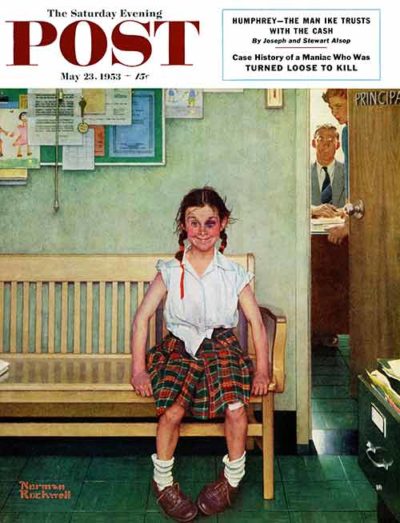
Norman Rockwell
From May 23, 1953
The door seen in the iconic Norman Rockwell Post cover Triumph in Defeat (some might know it as the Shiner or Girl with the Black Eye painting) is being preserved.
The Cambridge, New York, school that served as the setting for the painting is being renovated, and teacher Steve Butz wanted to make sure the principal’s office door seen in the painting would survive. It’s now part of a special exhibit, housed in glass near the school’s library.
By the way, the girl in the painting, the 11-year-old daughter of Rockwell’s lawyer, didn’t really have a black eye. Rockwell had to duplicate what a black eye looked like but was having trouble with the color. So he put out a call for someone who had a black eye, and a Massachusetts boy named Tommy just happened to have two of them. His dad drove him to the school so Rockwell could see what the eyes looked like.
The moral to this story is clear: Kids should get into fights so they can be part of American history.
How Do You Say “2018”?
Maybe my memory is wrong, but I remember when everyone used to pronounce a year like 2018 as “two thousand eighteen.” I don’t remember anyone saying “twenty-oh-four”; it was “two thousand four” (or maybe “two thousand and four”). But I’ve noticed that it’s now more common to hear “twenty eighteen,” and it’s something I don’t quite get. While you could make the logical argument that this pronunciation keeps it consistent with decades past (“nineteen seventy-two,” “nineteen ninety-nine,” etc.), I still refuse to do it. I’m not going to say “twenty eighteen.”
After all, what’s the title of that Stanley Kubrick movie about space?
Gone Away Is the Blue Bird
The Library of Congress has announced that it will no longer keep an archive of every single public tweet that is posted on Twitter. What, you didn’t know that the Library of Congress was keeping an archive of every tweet?
On January 1, the LOC began preserving tweets on a selective basis — only the ones they think are worth keeping as a historical record of the online service. But don’t worry, the picture you posted of that really great ham sandwich you had in the summer of 2013 will still be in the Library of Congress for future scholars to study.
People We Lost in 2017
A lot of publications and news shows do a year-end roundup of all of the famous people who died during the year, but no one does it better than CBS Sunday Morning.
As an addendum to that extensive list, I would add Maura Jacobson, who created crossword puzzles for places like New York magazine and The New York Times for more than 30 years. She died Christmas Day at the age of 91. And Peggy Cummins, the actress best known for her role in the classic crime film Gun Crazy — which was based on a MacKinlay Kantor short story published in the February 3, 1940, issue of the Post — who died last Friday at the age of 92.
The Best and the Worst
Best: I know we’re well into two thousand eighteen, but how about one more look back at last year? Dave Barry’s Year in Review is always a great, funny way to end the year.
Worst: I mentioned CBS Sunday Morning earlier, and former host Charles Osgood announced this week that he is retiring from his four-times-a-day radio show The Osgood Files. In this interview with Alex Silverman at WCBS, Osgood says that he’s not only dealing with two types of cancer, but his family has noticed he has slowed down a bit. He says he’ll still do a podcast now and then, but he’s no longer going to do a regular show. Osgood has been at WCBS for 50 years.
In the interview, Osgood mentions how great a country America is, and here’s a piece he wrote for the Post in 2009 that expands on that.
This Week in History
Hydrox Cookies Debut (January 1, 1910)
Did you know that Hydrox cookies are still around? I haven’t noticed them on my local store shelves in years — I would have bought them to refresh my memory on how they compare to Oreos — but you can still buy them in stores and online, thanks to a clever businessman who scooped up the Hydrox trademark for his company Leaf Brands when it became available a few years ago.
President George Washington Delivers First State of the Union (January 4, 1790)
It was originally called a Message to a Joint Session of Congress, and Washington made it from Federal Hall in New York City.
This Week in Saturday Evening Post History: Hot Pursuit Turns Cold (January 3, 1959)
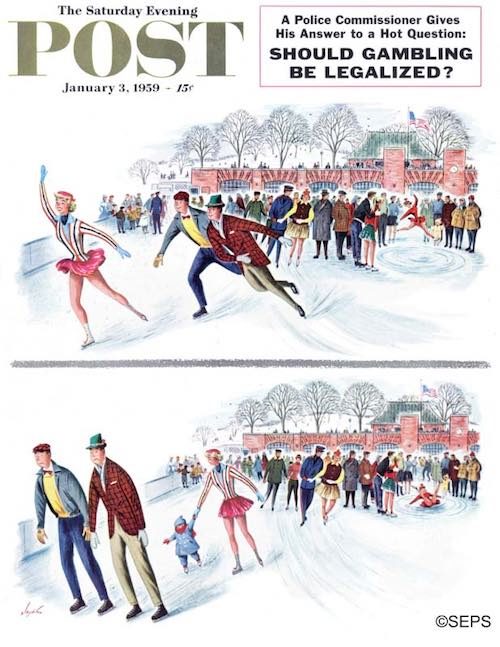
Constantin Alajalov
January 3, 1959
Hot Pursuit Turns Cold
Constantin Alajalov
January 3, 1959
I usually understand magazine covers, but this one has me baffled. It’s from Constantin Alajálov and depicts a winter skating scene. I get that the two men are trying to pursue the attractive female on skates in the first panel, but in the second panel, she’s behind the men and suddenly has a child. It’s almost as if there’s a panel of the painting missing. Or does the female skater have magical powers a la Samantha Stephens on Bewitched? Or maybe I’m just a dolt who doesn’t understand it? (Note: Me being a dolt is a distinct possibility.)
Later On, We’ll Conspire … As We Dream by the Fire
I had a post all set to celebrate National Whipped Cream Day, which is today. But then I thought, who the heck wants to think about frozen desserts when half the country feels like a frozen dessert? This is a time for cozy fires and comfort foods, so I decided to help you out by celebrating something I’ve talked about in past years: National Soup Month.
Chicken noodle soup is the ultimate winter soup, and here’s Curtis Stone’s recipe. How about something from Melissa d’Arabian, who isn’t on half as many Food Network shows as Guy Fieri? Here’s her recipe for Rich Roasted Tomato Soup. My mom used to love split pea soup, and here’s a recipe for a classic onion soup from Rachael Ray, with a good amount of golden cheese melted on the top of crusty bread.
Stay warm!
Next Week’s Holidays and Events
Epiphany (January 6)
The Christian holiday “celebrates the revelation of God incarnate as Jesus Christ” 12 days after Christmas. Don’t be surprised if you awaken to the sound of drummers drumming this Saturday, because recognition of Epiphany is the source of that incessant carol “The Twelve Day of Christmas.” It’s also the day that many families consider the official end of the Christmas season and take down their trees.
Letter Writing Week (January 7–13)
I’ve mentioned many times in this column how much I think everyone should get off social media and start writing letters again, so this is the perfect week to start doing just that. And if you need some reasons why you should keep writing letters, read Nicholas Gilmore’s excellent piece.
Cover Collection: Yuletide Shopping Shenanigans
The commercialization of Christmas is not a modern phenomenon. Holiday shopping can be a joy, but it often veers toward comedy. In the hands of Post cover artists, the mundane experience of making lists, checking them twice, and finally scavenging neighborhood stores to gather up holiday bounty is presented as equal parts delight, misery, and just plain silliness.
Under the humorous guise of this painting’s subject matter, Norman Rockwell makes use of snow as white space to break the image of an overloaded grandfather into completely disjointed components. It’s not quite a human being we are looking at, but pieces of one—a subtle nod to cubism, perhaps?
Incidentally, “Pops” Fredericks, the model for this illustration, was an actor who never quite succeeded on the stage or the screen, but who achieved immortality on Rockwell covers as a cello player, a seasick cruise passenger, a hobo, Ben Franklin, Santa Claus, and a beloved doctor patiently examining a little girl’s doll.
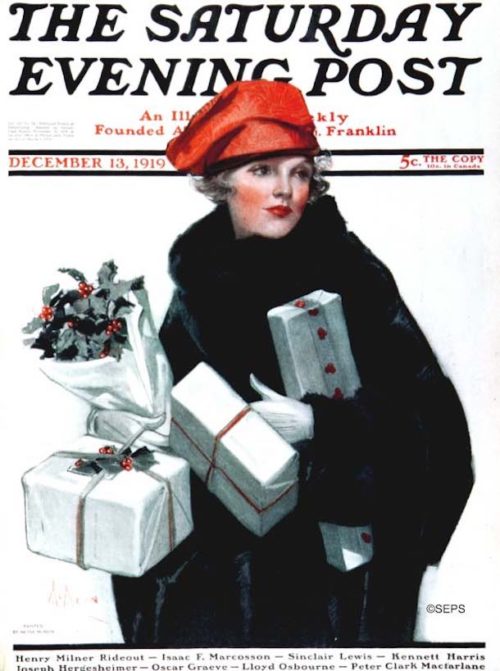
This stunning self-portrait by one of the Post’s more popular female artists makes use of winter’s white in an unexpected way. Not only is the background washed out—evoking a sense of snow—but the gifts are a stunning white against the stark black of the subject’s mink. The multi-talented McMein, a Midwestern girl from Quincy, Illinois, and star pupil of the Chicago Art Institute, moved to New York City with dreams of succeeding as an artist, poet, or musician. The year before painting this cover, she traveled to war-torn Europe as a correspondent for McClure’s Magazine. In the mid-1930s she would make an indelible stamp on the marketing world by creating the face of Betty Crocker.
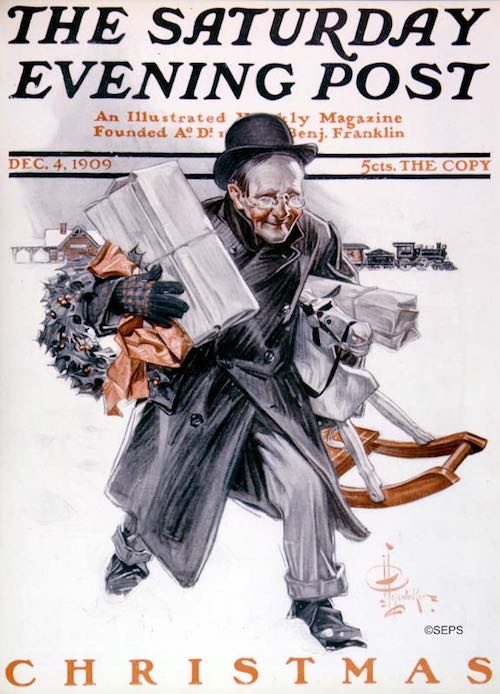
December 13, 1919,
Neysa McMein
The rocking horse was not new in 1909. It had been popularized in England during the 1800s, then galloped from small workshops into factory production. By the early 20th century, it was a staple toy in America and made frequent appearances on The Saturday Evening Post’s covers, especially around Christmas. Notice the detail in the harried commuter’s overcoat and pants. Leyendecker, whose roots were in fashion advertising, always gave close attention to the clothing of his models. A mentor to Rockwell, Leyendecker was also a darling of the public. At one point his fan mail eclipsed that of legendary film actor Rudolph Valentino.
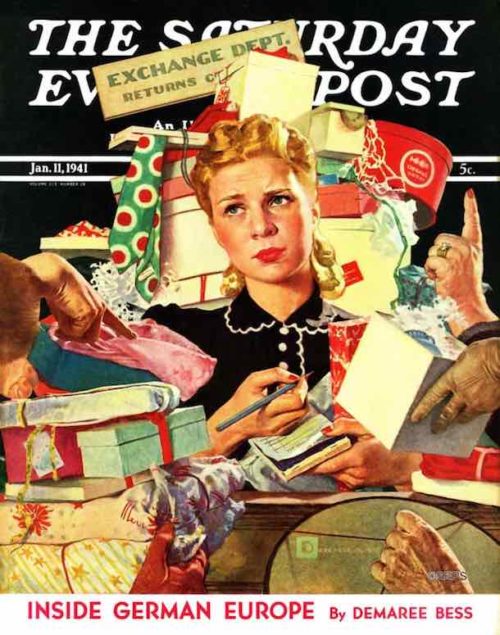
January 11, 1941,
Spencer Douglass Crockwell
The clerk’s face, almost floating in a sea of returned gifts, says all that needs to be said about the post-Christmas letdown. With its emphasis on the commonplace, the Post (and much of America) was willfully ignoring the global crisis brewing across the oceans. (The attack on Pearl Harbor that galvanized our engagement in World War II was still 11 months away.) Notice the signature, bottom right. Crockwell, who illustrated 18 covers for the Post, took to signing his illustrations “Douglass,” “DC,” or simply “D” to avoid being confused with another Post cover artist with a very similar last name.
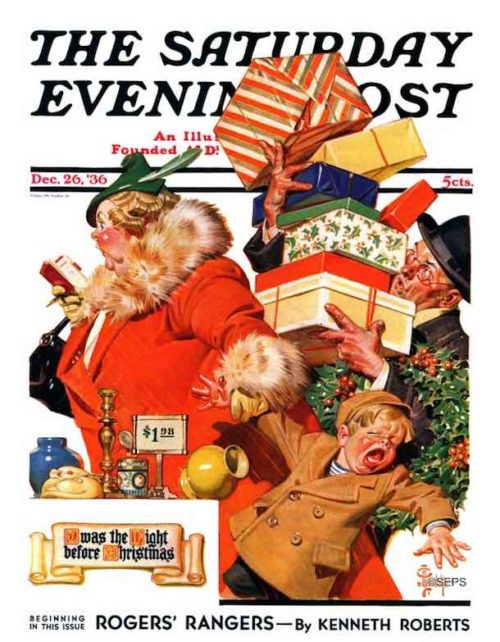
December 26, 1936, J.C. Leyendecker
Leyendecker was one of the longest running of the Post cover artists and certainly one of the most versatile. While best known for his stylish illustrations of fashionable people, he occasionally produced comic numbers, such as this colorful depiction of frantic, last-minute shopping. While many playful elements are at work, notice the visual pun of the bulky mom who bears an uncanny resemblance to St. Nick.
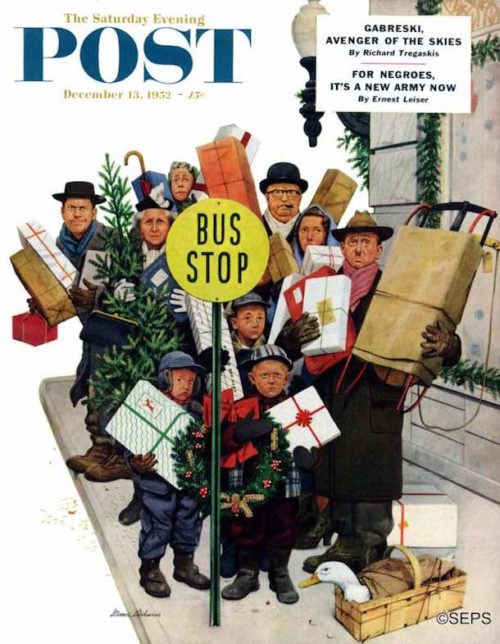
December 13, 1952, Stevan Dohanos
For this painting, Dohanos asked a man at a local nursery to
“saw me down a small Christmas tree to take out.” The little tree made this quirky cover in which all the players — duck included — seem remarkably complacent considering the circumstances. Post writer Rufus Jarman, a neighbor of Dohanos, makes a cameo appearance as the determined-looking man to the left of the tree.
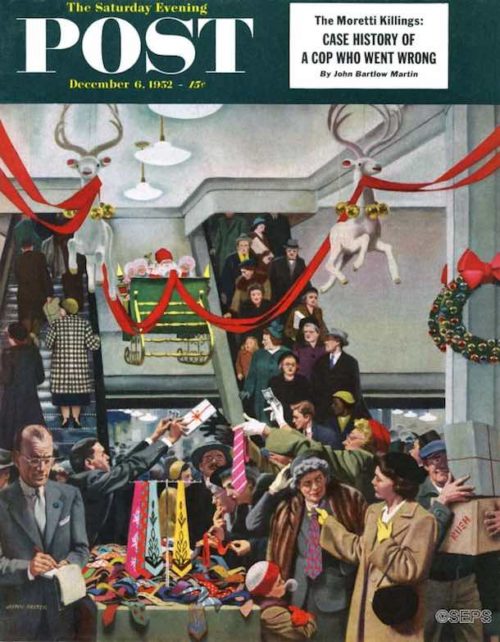
December 6, 1952, John Falter
Even 65 years ago, the ugly tie was universally recognized as the least desirable Christmas gift one could receive. But sometimes, well, that’s the best a person can do. For this hectic scene, Falter relied on his background working at his father’s clothing store in Falls City, Nebraska. By the late 1930s, Falter had moved to New York and was painting shirts and ties for Arrow Shirt ads before being discovered by the Post.
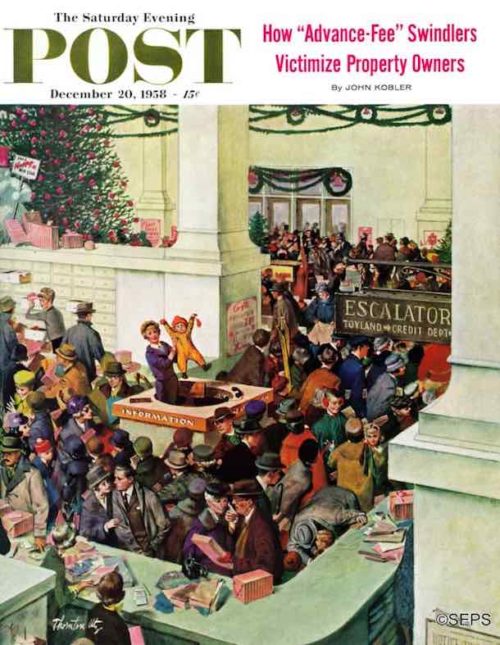
December 20, 1958, Thornton Utz
At the center of the image, a child at the Information booth will soon be reunited with misplaced parents. Meanwhile, countless other dramas are being played in Utz’s shopping pandemonium. Utz began drawing cartoons at 12 and knew he wanted to be an artist by the time he graduated from high school. But later he would say that he and a like-minded friend “could probably have been talked out of the whole idea if we’d been offered a good job driving a laundry truck.” With his knack for capturing humor in everyday situations, Utz became one of the most successful cover artists of the 1950s.
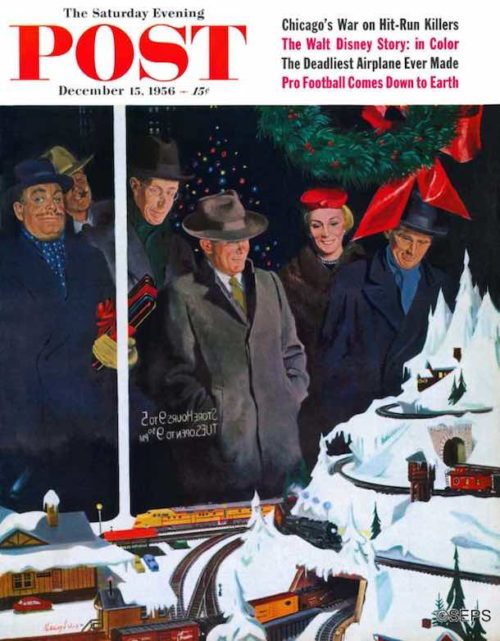
December 15, 1956, George Hughes
While drawing plans for a new home near Arlington, Vermont, Hughes decided to designate a room for his model trains. Months later, when breaking ground for his new home, his responsible side won out: He abandoned plans for the train room. But did he abandon his wish? One can almost feel the artist’s yearning for the magic of toy trains in this captivating holiday window display.
News of the Week: The Rockefeller Tree, Dangerous Toys, and Little Debbie Needs Your Help!
The Tree Has Arrived
How was your week? I pulled a muscle in my neck, had to get my stove fixed, and for the 32nd year in a row I wasn’t named People’s Sexiest Man Alive. But there is good news: The Christmas season has begun.
You might think the season officially begins when the red and green candy appears on supermarket shelves or when the department stores hang their wreaths, but it officially officially begins when the Christmas tree arrives on a truck in front of Rockefeller Center. It’s almost as if you’re given permission to call it the holiday season and listen to Christmas music when the big tree gets to New York City. Fa-la-la-la-la, la-la-la-la.
The lighting of the 75-foot Norway spruce happens the night of November 29 on NBC.
Toys: The Good, the Bad, and the Ugly

Two different toy-related lists were released this week, one naughty and one nice.
The consumer safety group WATCH (World Against Toys Causing Harm, which sounds like the name of a secret team of superheroes) has released their annual list of the 10 most dangerous toys. This year’s list includes the Wonder Woman Battle-Action Sword, Jetts Heel Wheels, the Slackers Slackline Classic Kit, and the Itty Bittys Baby Plush Stacking Toy. Yes, even toys with the word “plush” in them can be dangerous.
But this week also saw the induction of several toys into the National Toy Hall of Fame. The three inductees are the board game Clue, Wiffle Balls, and paper airplanes. What finalists didn’t make it this year? My Little Pony, Risk, play food (toys that look like food), Transformers, PEZ dispensers, UNO, and sand.
That’s right, sand was a finalist this year. Sand.
Where Will Amazon Build Their New HQ?
That’s the big question every state is asking these days. Well, maybe not Hawaii, but many of the other 49 states. Amazon is going to build a second headquarters, and many cities have submitted plans to the online retailer with their best pitch.
The Wall Street Journal has done a study to figure out which city would be the best fit for Amazon, taking into account such criteria as cost of living, taxes, access to college graduates and tech help, and culture. The paper says that the top three contenders are Dallas, Boston, and Washington, D.C.
What the company should do is build it at the North Pole. There’s plenty of land, there might be some elves looking for work, and people sort of think of Amazon as Santa Claus already.
It Better Not Be the Oatmeal Cremes
Which one? pic.twitter.com/L0JNW7SAVL
— Little Debbie (@LittleDebbie) November 8, 2017
That’s a tweet the snack company sent out recently. They’re getting rid of one of their popular snacks, and they want to know from you which one should go (actually, they say “one gotta go” and boy is that an odd phrase). Of course, there’s no real reason why they have to get rid of one of the snacks. It’s clearly a publicity thing, something they want to become a “meme” and “go viral.” Writer R. L. Stine likes the Oatmeal Creme Pies, and William Shatner wants them all to stick around.
I think it’s obvious which one will be hitting the unemployment line. It’s the Honey Buns. No one has a heart black enough to get rid of a cake shaped like a Christmas tree, Oatmeal Creme Pies are too delicious, and Nutty Buddy rhymes, and everyone likes when foods rhyme. So Honey Buns gotta go.
RIP Liz Smith
Liz Smith was a journalist for 60 years and is best known for writing about celebrities and the culture of Hollywood and New York for various newspapers from 1976 to 2009, when she was let go from The New York Post at age 86. She died Sunday at the age of 94.
Here’s a great video interview with Smith at The New York Times, where she talks about her experiences with people like Frank Sinatra, Donald Trump, Katharine Hepburn, and Barbara Walters.
Casablanca at 75
The classic Humphrey Bogart/Ingrid Bergman drama premiered in New York in November of 1942. Bill Newcott talks about the film in this week’s edition of “Movies for the Rest of Us,” and on Sunday, CBS Sunday Morning did a story about the film and its dedicated fans, including interviews with the children of stars Bogart, Claude Rains, and Paul Henreid.
This Week in History
George S. Patton Born (November 11, 1885)
Post Archive Director Jeff Nilsson explains how General Patton was part of the century’s best-kept secret.
The Star Wars Holiday Special Airs (November 17, 1978)
I’m not even sure if this has been seen on television since it first aired. Maybe only a few times or in snippets here and there. But thanks to YouTube, you can watch the whole thing. Along with Harrison Ford, Mark Hamill, and Carrie Fisher, you get sketches with Bea Arthur, Art Carney, and Harvey Korman. Plus: Jefferson Starship!
This Week in Saturday Evening Post History: Squawking Turkey (November 13, 1915)
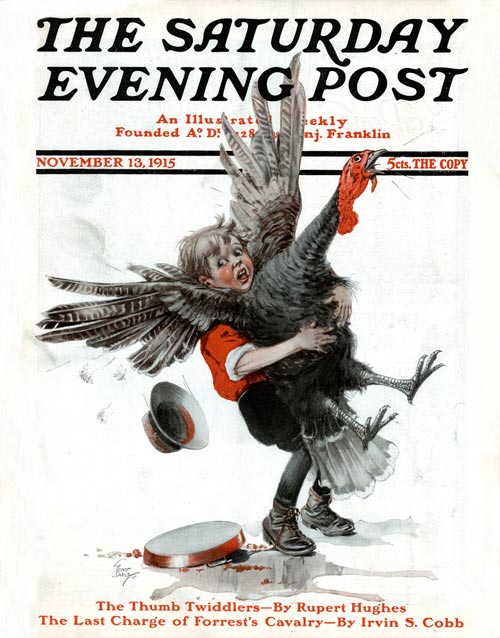
Tony Sarg
November 13, 1915
I’m trying to figure out how the scene in this cover by Tony Sarg unfolded. Why was a little kid sent to get a live turkey that’s even bigger than he is? What exactly is that on the ground, a pan and water?
“The Thumb Twiddlers” — mentioned below the picture — sounds like an article that could be written today about people addicted to smartphones and social media, but it’s actually a short story by writer and director Rupert Hughes, uncle of Howard.
Thanksgiving Recipes

Are you a traditionalist when it comes to Thanksgiving, or are you a bit daring? I’d like to think I’m the type of person who wants to try something new and out of the ordinary, maybe ham instead of turkey or Brussels sprouts or a pie made with a fruit I’ve never tried before. But when you get right down to it, I like my turkey and my mashed potatoes and the classic green bean casserole. Thank you, Dorcas Reilly!
But beyond those favorites, you’re going to need more for the day. Here’s a recipe for a sweet potato casserole, and here’s one for the perfect pie crust. Not sure how to cook your turkey? Here are some tips from McCormick, Food Network, and Melissa Clark at The New York Times.
If you have trouble cooking that turkey, you can always call the Butterball Turkey Talk-Line. They’ll tell you how long to cook your turkey, what to do if you bought your turkey in 1969, and what safety measures you should take for the stuffing.
Next Week’s Holidays and Events
World Hello Day (November 21)
This international holiday started in 1973, and the goal is for everyone on the planet to say “hello” to 10 people. And no, saying it to them on Facebook doesn’t count.
National Tie One On Day (November 22)
Macy’s Thanksgiving Day Parade (November 23)
While the turkey is cooking and the yams are yamming, you can turn the TV to NBC, where you’ll see the Macy’s Thanksgiving Day Parade, which NBC has televised every year since 1948. It starts at 9 a.m. Eastern.
Happy Thanksgiving!